#but is in fact central to the story itself
Explore tagged Tumblr posts
Text
it took a few years but y’all i’m finally deranged about the Fear Street trilogy
#fear street#fear street trilogy#fear street 1994#fear street 1978#fear street 1666#y’all part three fucked me up real bad#i was literally crying from Sarah’s execution onwards#like goodness what a powerful tragedy#and all of the killer designs were so fucking sick!!!#i wanna make my own now!!!#and deena#the horror protagonist of all time#more of her forever please#leigh janiak what’s your secret#how do i make a story this profoundly good AND fun??#i wanna make movies like this 😢#anyways i hope deena and sam are gay married and happy now#they deserve it#they’re doing sarah fier proud#it really is so fucking fantastic to have a story where the queerness isn’t incidental#but is in fact central to the story itself#and is a powerful force for good#internally beautiful
10 notes
·
View notes
Text


Those days I can never go back to.
The tale of hero Alec and holy wizard saint Faust.
※ Frieren AU | References from episode 2
#Alec Granvelle#Faust Lavinia#mahoyaku#まほやく#Alec who leaves bit and pieces in central country for Faust to come back to#a whole religion in fact…..#the central country itself is already a reminder of Alec existence#similar to Himmel huh#so if Alec did not burn Faust. Maybe their story from Alec to Faust would have been more like Himmel to Frieren#Hero party: Kakumei gumi… Alec Faust Figaro Leno#Current party: Faust and Heath -> Shino -> Nero#Shino who also wants to be a Hero…#then Nero joining the party last but also parting ways like Sein…#mahoutsukai no yakusoku#Promise of wizard#mhyk
22 notes
·
View notes
Text
It's ironic how a major part of Lord of the Rings is that storytellers always overlook hobbits in their legends because their simple lives are "less important" than the lives of Great Royals & Grand Warriors--- since that's ultimately been reflected in the current state of the Tolkien franchise itself! After the LOTR films, big-budget Tolkien franchise installments (and copycats) overwhelmingly focus on their Aragorn analogues, with hobbit-like characters shoved to the sidelines. The Lord of the Rings films may be flawed, but they succeeded because they had a strong central story-- the relationship between Frodo and Sam, and the fairytale-themes about small overlooked people who save the day while the villains are distracted by Great Heroes from Noble Bloodlines, are what give the story the deep lasting emotional impact that it has. But the franchise(tm) quickly decided that the royal warrior elves/men were the far more exciting marketable characters, and their battle skills could allow for more flashy spectacle. The Hobbit films gradually focused more heavily on the warrior characters, with Bilbo being a glorified extra by the last movie; The Amazon LOTR show focuses on a noble warrior elf of royal blood as its main character and political intrigue among the royalty of different kingdoms as its main plot; the recent animated film focuses on a noble hero of royal blood involved in epic battles. I've mentioned before that it's fascinating how all the new "Tolkien franchise" installments (as well as media inspired by LOTR) continue to center their stories on the Aragorn archetype-- a Destined Noble Hero/Warrior from a Royal Bloodline etc etc. The entire premise of Lord of the Rings is that Aragorn represents the hero of a typical generic fantasy epic, while the ordinary Hobbits are the heroes of this one. Aragorn is interesting not in spite of the fact that he is a side character, but because of it. If he were the central character of the story, Lord of the Rings would be very bland and generic. "Let's do a new version of Lord of the Rings but focus on powerful grand royal hero characters instead" is a lot like saying "let's do a retelling of Wicked from Dorothy's point of view." It's like, "congrats! you've successfully reinvented the exact type of story the original writer was commenting on and subverting." XD
6K notes
·
View notes
Text
Castles in the Fade, or What Was the Point of the Veil Anyway
Something that will now haunt me until the end of time is why was the concept of the Veil ever introduced into this series.
We’ve been hearing about it since the very first game. There’s a codex entry about tears in the Veil in Origins. Tamlen mentions a thin spot in the Veil if you play a Dalish elf. Sandal has a prophecy in Dragon Age 2: “One day the magic will come back—all of it. Everyone will be just like they were. The shadows will part and the skies will open wide. When he rises, everyone will see.” Admittedly, this is just one line said by a character who often says odd things, but it hinted to the fact they were planning to do something with the Veil from the very beginning. The state of the Veil is repeatedly brought up. It all had to mean something! Or so I thought.
When I saw “The Dread Wolf Rises” quest in Veilguard, I said, “Oh, here we go!” The Veil is coming down, magic is coming back, and it’s going to set up such an interesting story for the next game.
Alas, no.
I hadn’t really enjoyed my time playing Veilguard up until this point. It felt like the game was ducking and dodging every bit of world building and lore that could possibly bring nuance or complexity to the story. Every returning character or faction was a cardboard cutout of themself. They shoved Solas is a time-out box and gave him nothing to do. They refused to let him have any impact or influence on the story when he had been set up to be our main antagonist back in Trespasser. This game used to be called Dreadwolf! And while we learn about his past… we never talk to him about it. In the present, he’s in stasis.
Elgar’nan and Ghilan’nain are our villains. And they are your typical evil for evil’s sake villains. They are mad, bad, and only as dangerous as the narrative will allow as to not give Rook and co too much trouble. They are surprisingly patient while Rook fixes all their companions’ problems… until Elgar’nan moves the moon to cause an eclipse. A vital component in making his own lyrium dagger. For some reason. This guy can move a satellite!? And he just let Rook walk away in previous encounters… twice. Ok. Sure.
The Evil Duo need their own dagger ostensibly to tear down the Veil, because they want to unleash the full force of the Blight onto the world. Because they are evil. And they were thwarted last time they tried to Blight the entire world. Why do they think Blighting the world is a good idea? What’s the point of ruling a world if everyone is dead? I guess they haven’t thought that through, because of the madness and the evilness.
Ok, I thought. Perhaps the gods will be the one to tear down the Veil. Or maybe we’ll have a choice to let Solas do it his way before they can, which will be less chaotic and less full of Blight. Because the Veil has to be coming down one way or another? Why introduce the concept of the Veil, especially a Veil that has been thinning and failing since the series began, if it’s just going to… stay.
There is a principle in storytelling called Chekov’s gun. If something is mentioned in a story, it must have a purpose. If you keeping mentioning that gun hanging on the wall over the fireplace, it’s because at some point in the story, someone is going to take it down and use it. The Veil felt like Chekov’s gun to me. Chekov’s Veil, if you will. It’s been here from the beginning of our tale, the spectre hanging over our protagonists’ heads for multiple games.
The Veil has been a character unto itself. It was the central focus of the third game, and its dissolution was set up to be the core conflict of the fourth game. We learn everything we thought we knew about the Veil was a lie. It was not created by the Maker to separate the Fade from this world because of jealous spirits, it was created by a guy named Solas to trap the elven gods and the Blight from destroying the world. Also, the elven gods were never gods, and they are also evil.
This reveal will surely throw the Andrastian religion into chaos! This puts the very existence of the Maker into question! The Evanuris are a lie; it’s only fair Catholicism—oh, I mean—the Chantry is a lie too. We briefly touch on that in Veilguard… then it is quietly discarded. Religious crisis averted.
But I digress.
When the title of the fourth game was changed from Dreadwolf to Veilguard, I started to see the writing on the wall. Still, I held out hope the Veil would have some greater purpose in the story. That its introduction as a concept was for a reason. That something in this world would change.
Instead, from the get-go, the question of the Veil is no question at all. We only get Solas and Varric making oblique or catastrophizing statements about it. Solas says little beyond he has a plan. If I ever wanted to hear a villain monologue about their plan, it was now! Varric, on the other hand, decries Solas’s plan. He warns that should the Veil fall, it will destroy the world and drown it in demons. And that’s that.
We never really learn why Solas wants to tear the Veil down, or why he thinks it will help anyone. “The Veil is a wound inflicted upon this world. It must be healed,” he says. And that’s basically all he says about it in Veilguard. In Inquisition and Trespasser, we learn it took the immortality from the elves. It cut most of magic off from the world. Spirits are trapped and are being corrupted into demons, and most of what we know about spirits and demons is wrong. There are ancient elves possibly asleep? That part is left vague, but ancient elves are still about. We meet some in Mythal’s temple. There seems to have been some merit in bringing it down, because elves were flocking to Solas’s cause at the end of Trespasser. He had agents working for him already. What do they know that we don’t know?
Apparently nothing, because by the time Veilguard rolls around, there are no mention of agents. He is working alone. His only motivation now seems to be he’s too deep in his sunk-cost fallacy. The Veil is unnatural, so it must be removed—consequences be damned. We are never given any reason to think Solas has a leg to stand on in his pursuit of tearing down the Veil. We never hear any kind of counter argument from anyone, not even Solas, as to why the Veil should come down. We are only told it will destroy the world. It will drown the world in demons. This is all Solas’s fault.
There is no nuance. No complexity. No moral quandary to mull over. The game gives us vague warnings with no explanation as to what exactly is so world-annihilating about the Veil coming down. We must take Varric’s word at face value. We’re the heroes; Solas is the villain. Stop him.
It makes me wonder why Solas was ever a companion in Inquisition, let alone a romance option. Solas was presented to us as a complicated character in Inquisition. We had the potential throughout the game to make him see the value of this world, to help him realize he was wrong about it. “We aren’t even people to you,” the Inquisitor says in Trespasser. Solas replies, “Not at first. You showed me that I was wrong...again.” He began the third game viewing the world as tranquil, seeing the people in it as nothing more than figments in a nightmare, just as we saw our companions in the In Hushed Whispers quest. He ends the game having made friends, having recognized he was mistaken. He might have even fallen in love. (Or he may still seen no merit in this world if the Inquisitor antagonized him the entirety of their time together.) But something makes him continue with his plan to tear down the Veil, despite recognizing this world is real. He must know something we don’t. Something we’ll learn about in the next game.
We’ve been hearing about the Veil for three games now. We’ve set up our complex antivillain for the next installment, and he’s going to tear the Veil down. We swear to stop him or save him. But it has to be more complex than that. It can’t be so straightforward. Uncomplicated. Simple. Boring. Right? Right?
Nope. He really is just the villain, mustache-twirling and all. He apparently had no greater motivation, no as of yet unrevealed knowledge that would put this whole Veil thing into a new context. It was really as simple as the Veil falling will destroy the world, so Solas must be stopped. There is no new information that is revealed which makes us question what we are doing. Solas is never given any nuance or complexity to his actions. Nuance and complexity have actively been taken away. Both him and the Veil are looking like they are the worst things to be in a story: pointless. Why introduce the Veil if it’s just going to remain unchanged? Why introduce a character like Solas, bother humanizing him (for lack of a better term), giving us his backstory, setting him up as a cunning antagonist, only to make him look stupid, then put him on a shelf until the last ten minutes of your game?
Solas was the trickster archetype of this tale. He was our version of Loki from Norse mythology. What is the role of the trickster archetype? To challenge the status quo. To bring about events of extreme change, like say, the tearing down of a Veil that holds back all of magic. Loki is a huge contributing factor in Ragnarök. Through his manipulation, he causes the death of the beloved god, Baldr. This ushers in a long winter, which signifies the beginning of the end. Loki is imprisoned for this crime. When the final battle between gods and giants begins, the sun and moon are swallowed, plunging the earth into darkness. The earth shakes and Loki is freed to fight on the side of the giants. The world burns in raw chaos, falls beneath the sea, and is reborn. The world is remade, and a new realm of the gods and a new, better earth is formed.
It really felt like this was the setup they were going for. Solas causes the death of Mythal, and this is his catalyst for creating the Veil, which ushers in a world without magic. This could be seen as equivalent to the long winter. Solas falls asleep, trapped in dreams. He wakes and sets in motion bringing about the apocalypse. It’s not a perfect one to one, but it’s there if you squint. We have a war against the gods in Veilguard. I was expecting a few remaining Titans to wake and join the fight. But we don’t get any of that. There is a final battle, but it does not end in the end of the world. Or a better world. It just ends, and everything is the same.
It seems our trickster god caused his apocalypse thousands of years before our story started, when he created the Veil. His role in this tale was over before ours began, and he really is just some relic from a long-past age. He has no role, no purpose in this story. He is here to be thwarted. He is no Loki at all.
If you can’t tell, I wanted the Veil to come down. Did I think the Veil coming down would be painless? Have no negative consequences? No. Of course not. But keeping it up has negative consequences too. And it made for an interesting story. Or at least it could have. But we never explore that. The game presents no counter argument to having the Veil stay up, which, again, begs the question: what was the point of introducing the concept of the Veil at all?
Did I think the Veil coming down was actually the best solution to help Thedas become a better place? I don’t know, and I never will, because the game never argues for it one way or another. It just tells you to want it in place and to stop asking questions. In real life, a catastrophic event is not the best way to solve any of the world’s problems. But this is the realm of fiction. We have gods and monsters, magic and myth. We have introduced the status quo of Thedas, recognized it needs to change, then our trickster god appears ready to fulfill his role in the narrative.
Instead, it all comes to nothing.
I got to the end of Veilguard… and everything was more or less the same as it was at the start of Origins. Veilguard actually tries its hardest to pretend any previously mentioned problems don’t exist, so of course the Veil coming down has no merit. There are no problems to solve in this world, apparently. Solas is just stuck in the past and can’t get with the times. Silly Solas.
The Veil isn’t even a permanent solution. It wasn’t to begin with. It was some duct tape wrapped around a broken pipe, and we’ve just slapped an extra piece of tape on it. It’s still leaking. It is still unnatural, and will fall eventually one way or another. Large amounts of bloodshed weaken it, so I guess Thedas better achieve world peace real quick to avoid any battles. There were seven super-powered mages holding it together… now there is just one. Ironically, the Veil was going to fall after two more Blights anyway. The Wardens were doing Solas’s work for him! It would also have released the full force of the Blight at that time… which Solas was trying to avoid, I presume.
It feels like keeping the Veil up just pushed a big problem onto Thedas’ future generations. We’ll keep slapping bandaids on it until it all falls apart. Someone else can deal with the fallout, but we’ll be dead by then, so who cares.
Primarily, I wanted the Veil to come down from a storytelling perspective. The Veil was an interesting concept and I wanted the story to do something interesting with it. Conflict is what makes stories stories and the Veil coming down could create so much compelling and complex conflict. And the Fade is weird, and I like weird. Stories are also about change, and I wanted to see Thedas change. Yet, Veilguard is over, and barely anything has changed. Instead of magic coming back being a conflict for the next game, they went with Fantasy Illuminati. Oh.
The Veil turned out to be a nothing-burger, and no problems in this world are even close to being solved. Slavery is still rampant in Tevinter. The elven people are still oppressed everywhere. Mages have no more rights in the South than they did in Origins. Spirits are still trapped and being corrupted. The Calling still exists, though might be different somehow now? They don’t really get into that. The Chantry’s validity is still not allowed to be questioned. The Blight still exists in some form, but again it’s vague. Oh, and we learn the dwarves have been gravely wronged, and the Titans are still tranquil. At least if you redeem Solas and a romanced Lavellan joins him, they can work together on healing the Blight and helping the Titans. Oh, good. One problem is being acknowledged and some action will be taken. Offscreen. Hurray? Solas doesn’t have a really great track record of fixing problems, so Lavellan is definitely going to need to be there to make sure he doesn’t fuck it up.
For some reason, this game seemed terrified of letting us think about anything for more than two seconds. It shied away from complexity or nuance at every turn. The game is called The Veilguard—ironically, that word is never uttered in the game—but we are given no real motive for guarding the Veil. We’re unquestionably the hero. The villains are uncomplicatedly evil. Save the world… never wonder what you are doing or why.
I wanted the game to make me question if the Veil staying up or coming down was the right choice. I needed to be given a real counter argument. Convince me the alternative would actually be better or worse, because as I mentioned… things suck quite a bit in Thedas already for a lot of people right now. Let the Veil’s fate be a difficult choice to make. If the conflict cannot be what to do about the Veil, it should be am I doing the right thing about the Veil. If the heart of your game is so thin on motive, everything else falls apart around it.
I hoped they were setting up a complex, Thedas-sized existential conflict for this game in Trespasser, but no. I wanted something to happen, but nothing did.
I want to feel challenged and changed by a story, not left feeling empty. I’m tired of superficial entertainment. I want to sink my teeth into a narrative that doesn’t paint the world in broad strokes of black and white, good and evil, heroes and villains.
Ultimately, I think my issue is why even introduce a concept like The Veil if you’re not going to do anything interesting with it. Or anything at all. What I thought was Chekov’s Veil turned out to just be a MacGuffin. And that’s disappointing.
#dragon age#the veil#the veil the veil the veil#solas#in which I shake my fist at heaven for 3000 words
1K notes
·
View notes
Text
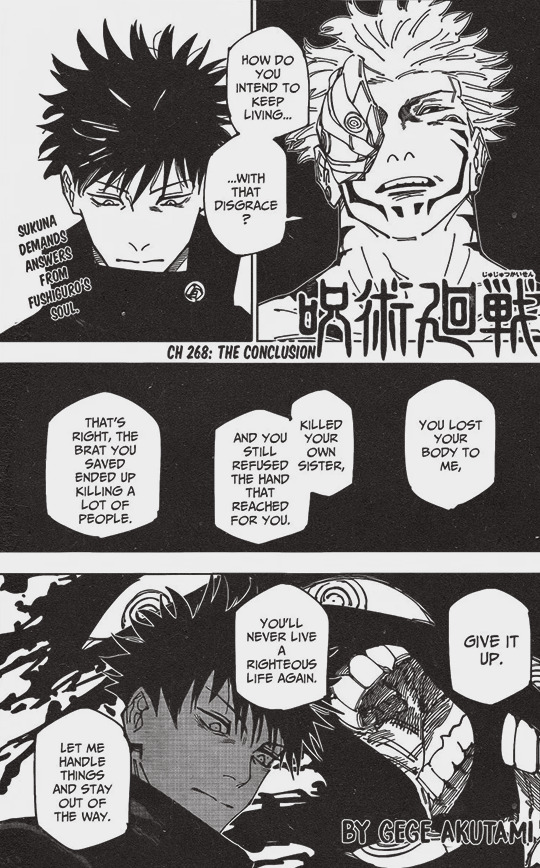
ONCE MORE, I THINK I'LL LIVE FOR OTHERS
So of all the characters in Jujutsu Kaisen Megumi has turned out to be one of the most controversial and hotly debated characters. There's nothing the internet hates more than a boy with trauma, I guess. Jujutsu Kaisen is a controversial work in general so it's not surprising that the ending wasn't super well received by the fans, especially in the way it decided to conclude Megumi's character arc.
There are many people accusing Gege of giving Megumi no character development. Of Megumi just choosing to replace Tsumiki with Yuji. Lots of complaints about Megumi never finishing his domain expansion among other things. Of Megumi being nothing more than a damsel for Yuji to rescue in the end. I'm here to say I think Megumi does have a complete character arc even if it didn't end the way I would have liked, and under the cut I'll be giving my thoughts for Megumi's ending and JJK's ending in general.
I CAN ONLY SAVE THOSE WHO ARE PREPARED TO BE SAVED
If you were to ask me what the most important arc in Jujutsu Kaisen is, it would be Hidden Inventory. Hidden Inventroy covers the inciting incident which leads to all the conflicts in the main story, Riko's death, Geto's defection, Tengen's merger failing, and Gojo's decision to adopt Megumi.
However, it also shows us what motivates Gojo in the main series, mainly his desire to raise this generation of students into strong and intelligent allies because of his inability to save his closest friend when it most counted.

If the quote that summarizes the central theme of Jujutsu Kaisen Zero is "Love is the most twisted curse of them all."
Then I put forward that the quote that summarizes the theme of the main series is what Gojo said to Yaga post Geto's defection, "Being strong isn't enough, I can only save those who are prepared to be saved."
Just like Hidden Inventory is centered around Geto and Gojo's relationship in their youth, the main manga itself centers around Megumi and Itadori's relationship. The manga itself starts with their first meeting. Yuji devours the finger in order to try to help Megumi. Megumi requests Gojo help save Yuji from execution because he didn't want to see another good person die.

Megumi and Itadori are also a deliberate parallel to Geto and Gojo's friendship in the past. To begin with Gojo tried to nurture these relatoinships in his students so they COULD get along and enjoy their youths the way he remembers doing so with Geto in his three springtime of youth.
He not only encourages Megumi to selfishly try to save Yuji even though it is against the rules of sorcery and poses a risk to other people, he also encourages them to socialize at every opportunity.
The strong and intense friendship that Megumi and Yuji enjoy is not only a clear parallel to Geto and Gojo's special connection with one another, but also the fact that a strong reocurring motif in Megumi and Yuji's friendship is their strong desire to save each other. Which is a clear parallel to Gojo's inability to save Geto in the past.
As I said for a long time Yuji and Megumi were being set up as this generation's version of the "strongest duo" except they were going to be able to break the cycle. Whether it be by Megumi saving Yuji, or Yuji saving Megumi, they wouldn't be driven apart by the corruption in the Jujutsu World the way that Geto and Gojo were.
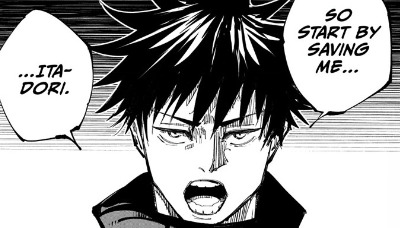
As I said the central question of Jujutsu Kaisen especially in regards to Megumi and Yuji's friendship is if it's possible to save someone who doesn't want to be saved. Which is why Megumi and Yuji both wanting to save each other is something that happens again and again at different parts of the manga. Whether it be the ending of Origin of Obedience where Megumi and Yuji are both unable to talk to each other because they want to try to protect the other from information that might harm them. Megumi hiding the fact that he knows resonance between the Sukuna fingers awakened the curses. Yuji hiding the fact that Megumi's decision to save Yuji has caused strong curses to awaken and kill other people.
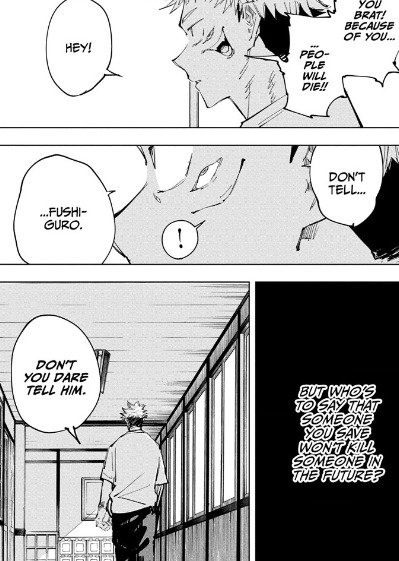
Just as often as these two try to save each other, they fail. Megumi watches Yuji die early on when Yuji takes back control from Sukuna and decides to die without a heart.
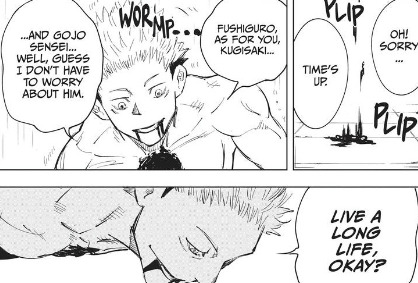
Megumi spends the entirety of the culling games clinging to Yuji's side no matter how Yuji tries to push him away because he knows Sukuna has plans for him. However, Megumi is afraid to leave Yuji alone because he knows Yuji is in a dark place after the Shibuya massacre and that if he's left alone Yuji might just find some way to off himself in a heroic sacrifice to try to atone for the people lost at Shibuya.

Only for Megumi's insistence on clinging to Yuji to backfire because Sukuna ends up taking his body from him in a critical moment. When Sukuna takes his body their circumstances swap and Megumi is the one who's body is being used to kill people by Sukuna. When Megumi has to live with the guilt of Sukuna using his body to kill both his sister and his teacher, he's not able to live with it anymore.
Then their positions swap completely and it's Megumi who wants to die to atone for the guilt, and it's Yuji who doesn't want to let go of Megumi and will do anything to save Megumi from both Sukuna and the other sorcerers even if the right thing to do is just kill both him and Sukuna and letting him live means putting the whole rest of the world at risk.
As you can see not only is saving each other a common theme of Megumi and Yuji's relationship, but at different points of the story both of them are trying to save the other even when the other doesn't value their own life.
Gojo's relationship with Geto is defined by his inability to reach his friend in time, and how he was "left behind" in the end.
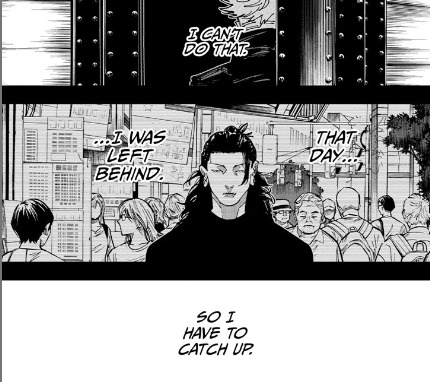
Gojo explicitly waited a year after learning about Megumi being sold to the Zen'in clan to do anything, and only decided to intervene after Geto's defection. Gojo's decision to mentor Megumi was inspired by Geto leaving. He even said "Don't get left behind."
His hope in taking in students like Megumi, Yuta and Yuji was twofold first that he'd be able to handpick and raise several strong students who would eventually replace the elders and reform the Jujutsu World. The second and more personal motivation is that he wanted these students to be able to support each other and be strong allies to one another so they wouldn't end up alone like Gojo did in his youth.

Gojo's intentions were good however, Gojo has a very flawed understanding of how people and relationships work. In Gojo's books "strong=good" and almost everything can be solved by strength. Notice just one chapter ago Gojo said that being strong wasn't enough, he can only save those who are prepared to be saved and yet one chapter later he tells Megumi that he needs to get strong otherwise he'll be left behind.
So, even when Gojo knows that being strong isn't enough and didn't make a difference with Geto, that's still the only real advice he can offer Megumi.
A big theme of Jujutsu Kaisen is the failures of the past generation affecting the present. A lot of people in trying to put Gojo on a pedestal fail to realize one of the central themes of this manga is GOJO WAS WRONG. The way Gojo went about doing several things wasn't the right way. Gojo wants the next generation to succeed him and do better than him, because Gojo himself knows that he was wrong and he's a part of the past generation.
I think a big part of the reason the conclusion to Megumi's character arc is poorly received is that Megumi didn't end his arc the way that Gojo set out for him.
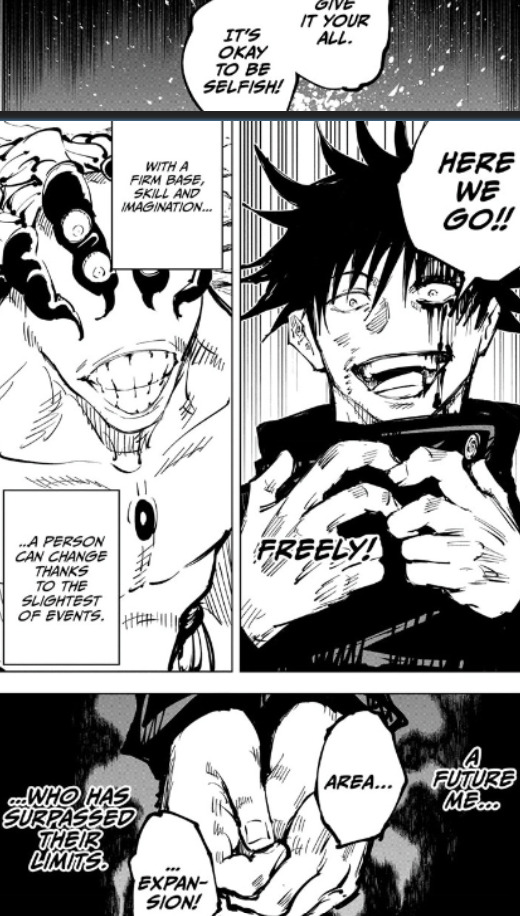
Scenes like this led the audience to believe that Megumi's character arc was going to be completed by him learning to be more selfish and living up to the potential that Gojo saw in him. That we were going to get a completed domain expansion. That Megumi was going to become stronger than Gojo because the ten shadows was the only technique to ever beat a wielder of the limitless and the six eyes.
I understand wanting to see Megumi living for himself, and how cool it might be to see Megumi's complete domain expansion after Gege teased us with this twice but I have to ask this.
If Gojo was the strongest sorcerer in the world, and that still wasn't good enough to save Geto. Then how would Megumi reaching his full potential as a sorcerer in any way help Megumi avoid making the same mistakes that Gojo did?
HAVEN'T WE HAD ENOUGH OF GOJO SATORU
I think a lot of dissatisfaction in Megumi's character development comes from he didn't really follow the path that Gojo set out for him. He didn't unlock his full domain expansion, he didn't learn to live more selfishly. They say that Megumi simply choosing to live for Yuji isn't him learning to stand on his own two feet because he's just hinging his self worth on someone else the same way he did with Tsumiki.
However, I have to ask.
How exactly would Megumi becoming more like Gojo or more like Sukuna be any better?
A big recurring theme in Megumi's arc is his lack of agency, and how many different adult figures have tried to mould him to their own selfish ends.

In the same chapter where Megumi has the flashback where Gojo encourages him to become more selfish, Sukuna has his hands wrapped around Megumi's neck in the colored page. Sukuna was never actually trying to mentor Megumi.
He only had an interest in Megumi because his ten shadows techniques was a way to bypass Gojo's infinity. Henever actually cared about Megumi reaching his full potential. He was grooming Megumi in the long term so he could snatch his body and turn him into a weapon against Gojo Satoru. The same way that Gojo only decided to take Megumi in and mentor him in the first place because his technique meant he had great potential as a sorcerer and a future ally in Gojo's crusade against the elders.
Megumi's life is defined by every adult in his life trying to mould him or use him selfishly for his own gains. His father sold him to the Zen'in clan for gambling money and abandoned him. Gojo only was interested in a strong ally against the elders. Sukuna is just one in a long line of people who are trying to shape Megumi into something he's not for their own selfish desires.
Ngl, the fushiguro girlies are kinda onto something with their characterization of Sukuna’s possession as the physical embodiment of his lifelong struggle for self determination and autonomy and how others have always pupeteered his fate for their own devices and he’s thusly never put himself first ─ his selfishness functioning ultimately as platitudes which still center others and his consideration for them. [SOURCE]
So if all of Megumi's various abusers have tried to make Megumi into something he's not and robbed him of his agency in the process, then is the best ending for Megumi really to become more selfish like Gojo or Sukuna?
If Megumi ended his character arc by using a complete domain expansion, and reaching Gojo's level of power wouldn't that be validating the way Gojo stole Megumi's entire childhood from him in order to make him a strong sorcerer. Wouldn't it look like the narrative was going, yeah, it was wrong for Gojo to groom Megumi like that, but look how strong it made him!
We already have a version of Megumi who learned to live only for himself, someone who broke the chains of fate and became entirely free.
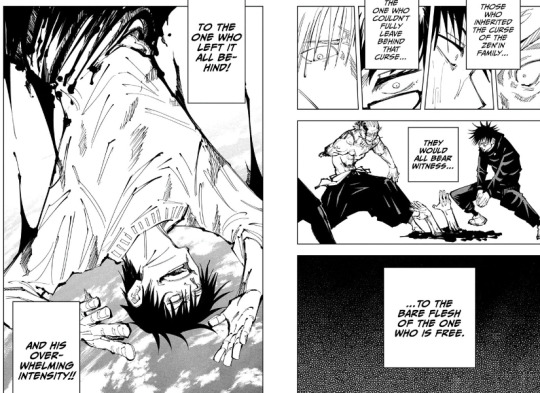
Toji shows us a version of Megumi who lived up to his full potential as a sorcerer, became someone strong enough to threaten Satoru Gojo, and who put himself above everyone else and... Toji's fucking miserable.
Toji is the bad ending of Megumi. He's strong but that's all he is. The narration refers to him as a puppet of carnage, only living to fight the strongest around. In fact, Toji dies BECAUSE he wanted to feel validated as the strongest. The decision to say and fight against Gojo when Gojo unlocks reverse cursed technique leads to his death. Being the strongest and his desire to be validated as someone strong is nothing more than a curse for Toji and what allows him to escape the cycle is not strength, but rather seeing that his son has succesfully escaped the abuse of the Zen'in clan.
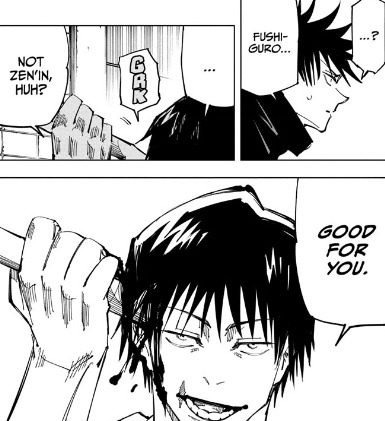
So having Megumi live up to his full potential as a sorcerer, or living selfishly the way that Gojo or Sukuna wanted him to wouldn't really be breaking the cycle, because it'd be Megumi acting the way his abusers wanted him to act. If anything it' be Gojo's long term grooming of Megumi finally succeeding.
I understand that Megumi fighting back on Sukuna from within with one use of ten shadows to create a puddle underneath Sukuna's feet isn't the most dramatic way to signal his journey of self-realization, but sometimes the flashy, dramatic, and satisfying thing isn't always the right thing.
if the central relationship of the series is Megumi and Yuji, and the central question of that relationship was "is it possible to save someone who doesn't want to be saved-" then resolving both Megumi and Yuji's character arcs requires answering that question. That's the most important part. How are we going to break the cycle and have Megumi and Yuji save each other in a way that Geto and Gojo weren't be able to.
Yes, I understand wanting Megumi to be his own person and stand on his own two feet, but before he's a person Megumi is a fictional character. Megumi and Yuji are characters intentionally designed to be each other's other half. The same way that Geto is designed to be the other half of Gojo. They both represent a yin / yang pair. They both represent the shadow and the light, the sun and the moon.
People also talk about wanting Gojo to learn to be his own person outside of Geto, but that's also missing the point. Gojo isn't a person to begin with he's a character designed to be the other half of Geto. All of those parallels that exist between them, both of them getting their bodies stolen from them, both of them becoming monsters (geto slaughtering the village, Gojo slaughtering the elders), both of them dying on the same day. Those are intentional, because they're fictional characters meant to represent the concept of yin and yang and balance. Gojo cannot exist without Geto, Geto's body causes Gojo to get boxed, Gojo dies within a year of killing Geto, because they're meant to represent the taoist concept of BALANCE in a manga that's about BALANCE. Gojo cannot achieve balance with the character that symbolizes his yin. Whereas, Megumi's way of achieving balance is to find a way to make things work with his other half Yuji in a way that Geto and Gojo failed to.
As someone who used to be the biggest Megumi Corruption Arc truther, I've come around in my thinking and I can at least understand why Gege didn't go that direction. Megumi learning to be selfish like Gojo would be changing too much of Megumi's inner nature, because as much as Megumi pretends to be selfish as an excuse he still is someone who wants to help people.
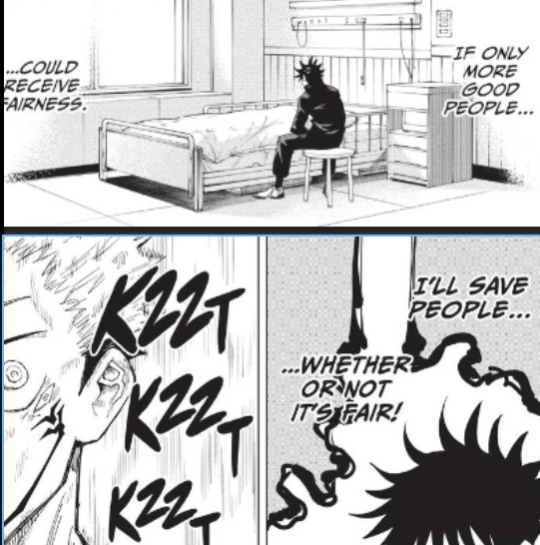
There's nothing wrong with Megumi wanting to help people, or wanting to be a team player. It was Megumi deciding to hinge his entire self worth on just his ability to help one person. It's why he couldn't go on when Tsumiki died, not just because he was grieving his sister, but because he decided to make protecting his sister his entire reason to live and genuinely saw no other reason to keep on living.
A lot of people say that Megumi is just deciding to make Yuji into an emotional crutch the same way he once did with Tsumiki, however, I don't think these lines of dialogue really indicate that.
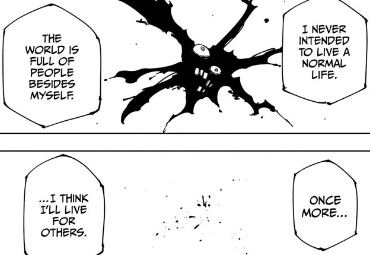
"The world is full of people besides myself. Once more I think I'll live for others."
To begin with, Megumi says that the world is filled with lots of people. Megumi didn't want to go on because he didn't think he'd ever love someone as much as he loved his sister. That there was nothing in the world worth living for if his sister was gone.
However, now Megumi is acknowledging that there are more people in the world than just Tsumiki. That he might come to love them the same way that he loved her. That he shouldn't give up on life just because he lost one person, no matter how important that person was.
Megumi's words run contrary to the idea that he's just going to use Yuji as his next living emotional crutch, because he says the world is full of people. There's more people than just him, there's more people than just Yuji, as long as Megumi makes the choice to continue living then he can go out into the world and meet them.
Jujutsu Kaisen is a very individualist manga, and I understand we also exist in an individualist society so we want to see Megumi stand on his own two feet and live for himself, but I don't think Megumi deciding he'll live for others is a bad thing. This is just a few chapters after Yuji said that what makes life meaningful is the memories you leave behind with other people. Which is the exact same sentiment.
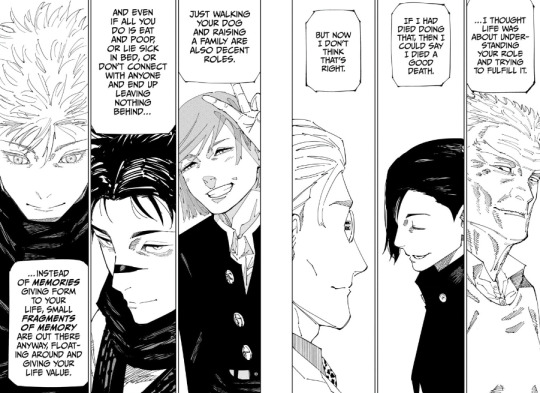
Yuji is able to break free from the cog mindset when he realizes that all the people he connected to in his life gave his life meaning, even if they died tragically, even if he only knew them for a short time. Choso's final words are "Thank you for being my little brother" and that connection was incredibly important even though they only knew each other for about a month. Yuji's life became meaningful because he went out into the world and made all these important connections.
Now Megumi is doing the same thing. He's resolved that even though his sister is dead the world is full of people he can connect with. That he can come to love other people the same way that he did. That his life is still worth living because he can find new people to love. Is Megumi deciding he can try to live for the other people in his life and his connection to those people even after the loss of his sister made him feel like his life is worthless and he'll never love anybody that way again, really that different from Yuji deciding that the people he made connections too gave his life value?
Jujutsu Kaisen lifts from other manga, this is pretty common knowledge. Killua and Shinji Ikari are probably the two biggest inspirations for Megumi and both are two very passive characters who are entirely reactive. They don't decide, they don't act, they react to the decisions of people around him.
Killua's ultimate moment of character development isn't beating his abusive big brother, or his abusive parents in a physical fight after getting a power up. Killua's greatest moment of character development is accepting Nanika as a part of Alluka. Something he was too afraid to do because it would mean that his family would continue to try to exploit Alluka for her wish granting abilities.

Killua finishes his arc with the resolution to protect both Alluka and Nanika from the rest of his family. Considering that Killua has been centering his entire self worth around his usefulness to Gon by this point you could call it Killua is just replacing Alluka with Gon as a crutch if you were cynical. Or you could just say that Killua, like Megumi is someone who lives for their loved ones and finds value in the bonds he makes with other people.
Shinji Ikari spends the entire 26 episode run of Neon Genesis Evangelion not making a single decision, and his final moment of character development isn't really that much character development. He simply makes the decision to reject instrumentality and try again. To go back to the real world and try to be a person in the world again, because as long as you're alive there's still a chance to be happy.

Megumi like Killua, never really changes. It's in Megumi and Killua's nature to be a protector / a nurturer. They want to take care of the loved ones in their lives. Megumi and Shinji both have an arc where it takes the entire anime / manga to take the very first step. Their arc is there to depict how hard it can be to take that first step on the journey to change when you're as traumatized as someone like Shinji or Megumi.
Megumi's arc especially is about him making his very first decision in the whole manga. As I said the central question of Megumi and Yuji's relationship is can you save someone who doesn't want to be saved and Yuji eventually finds you that you can't.

Yuji's greatest moment of character development and empathy for Fushiguro is realizing he can't force savlation on Fushiguro if Megumi doesn't want it. He can't force Megumi to live. He can't just tell Megumi to be stronger.
In doing so Yuji does something that no one has ever done to Megumi in his life, and offered him a choice. Gojo expected Megumi to be as strong as him and saw him as a mini-gojo never once taking his opinion into the matter. As I said above Gojo sees being strong as the soliution to all of life's problems. His adivce to Megumi was don't be weak, otherwise you'll be left behind.
Yuji allows Megumi to be weak. He says that Megumi doesn't have to be strong and suck it all up. The metaphor of Yuji and his grandfather works well to show how Yuji truly understood Megumi in a way Gojo never did. Gojo expected Megumi to be as strong as him. Gojo encouraged Megumi to grow up into another Gojo. Gojo failed to understand Megumi in many ways because he wasn't Gojo, and enjoy Jujutsu and being a sorcerer the way that Gojo did.

Yuji relates the story of his grandfather rejecting chemo treatment. At the time he didn't understand why his father would refuse the treatment just because it was painful, because Yuji being young would have been very easily able to handle the pain. However, after Yuji went through trauma and started dealing with suicidal ideation in the aftermath of Shibuya he understood why some people wouldn't want to keep fighting.
Yuji knows what it's like to be weak and want to give up so he doesn't want to force Megumi to be strong. Gojo projected himself onto Megumi and expected Megumi to always be strong and to love Jujutsu like he did, and didn't understand the ways Megumi was different than him. Yuji on the other hand accepted Megumi for who he was with those words, even though Megumi was weak and didn't want to continue living Yuji didn't crticize him he accepted that Megumi was different from him. He accepted the fact he didn't really understand Megumi's pain. He validated Megumi's pain and didn't try to dismiss it.
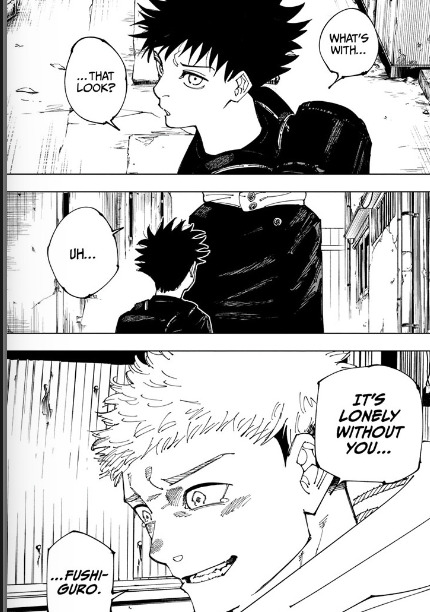
This parallel to Gojo and Megumi's first meeting is so important, because Gojo showed up in that child's life only to exploit him. While Yuji gave Megumi a choice. Even if it meant that Yuji would be lonely and heartbroken, he still gave Megumi a choice on whether or not he wanted to live.
In the end Yuji gave Megumi a choice, and Megumi made that choice to keep living. Just like Shinji, Megumi's entire character arc was just leading him up to taking the first step on his journey. Just like Shinji, Megumi's entire arc is defined by his choices being taken away from him but the very first choice he makes is his most important one: the choice to live.
So yes, a Megumi corruption arc would have been really cool but I think the answer of "You can't save someone who doesn't want to be saved, but you can still love them" is a beautiful one.
#jjk meta#megumi fushiguro#yuji itadori#itafushi#satoru gojo#suguru geto#satosugu#ryomen sukuna#jujutsu kaisen spoilers#jjk 271#jujutsu kaisen 271#jujutsu kaisen#jujutsu kaisen meta
409 notes
·
View notes
Text
Yeah, I think at the end of it. I get, understand, and agree that the narrative moment we're at is "Bells Hells, feeling they don't have the resources to fight Ludinus a second time today and still uncertain about the central question of what is to be done about the gods in Exandria, move toward Predathos in an attempt to control a situation they feel is inevitable. Imogen feels she has to make the choice to accept it into herself because Predathos is still moving toward her and the Ruidusborn, tragically boxing her into this because she feels she has no other meaningful choices." Great, amazing, I totally understand this, and it is a natural beat and one that coheres as a culmination of the campaign. It's actually a pretty great beat in summary.
The frustrating thing ultimately feels to be the execution, because it constantly feels like the story is meandering from beat to beat after an incredibly long series of meanderings over the course of the campaign. It's ultimately fine the characters feel uncertain, but the storytelling itself feels uncertain as well about what it is doing and that is less fine. Every decision is made with a sort of timid "I suppose that's the thing to do, I don't really know" at the table level without a very clear sense of what they're moving toward narratively, and that's really more of the problem. It's undercutting what is otherwise a really great direction.
Decisions don't feel like they have teeth because the storytelling is so hesitant about whether it's the right direction to take, so the needed feeling of stakes, inevitability, tragedy, suffocating circumstance don't exist in the way they should to give what's happening the needed sense of clarity. It feels like we're all moving through a bog in a not fun way because the story itself isn't sure what it's moving toward even in a sense of vibes or structurally. moving confidently and toward a tragedy in a sense of trapping the characters and cornering them would've done wonders, but instead it kinda has the feeling of trying to unroll a carpet dramatically and it just kinda slowly stops. Like, it's a slow drift down a lazy river instead of feeling dragged out with the tide.
It is a really great beat to have Imogen accepting Predathos because she feels she doesn't have any other choice in the series of pressures occurring right now. But, the pressure doesn't really feel like it exists because it all feels disconnected from the moment or too gently / abstractly applied or too slow to be framed, and the inevitability aspect doesn't feel like it's quite standing because narrative inevitability comes from momentum and strong storytelling intent and purpose, and it's never felt like this campaign has had that. The storytelling is hesitant and uncertain, so the tragedy doesn't quite come through on experience of the moment, even when it does come through in summary.
And that's more the frustrating thing. It's a good beat executed a little too uncertainly. The choice itself for the character is a good one, but it — like much of the campaign — feels like it lacks a storyteller trust in the narrative or trust in the choice itself to make it really feel satisfying as an execution. I genuinely wonder if that's ultimately what I'm bouncing off of, the fact that it doesn't feel like the table is trusting in the narrative or trusting the choices they're making for the story or trusting in themselves and each other to carry through the story they’re telling, so the intentionality and purpose feel off and it's stripping a great beat of its power by making it feel hesitant at a narrative mechanics level.
#CR spoilers#Critical Role things#Truly just trying to articulate that I am ultimately fine with the beat itself and I think it has good meat on it and I get what it is#It's just that there's something about the sort of like.... narrative mealymouthedness? uncertainty? lack of confidence?#It doesn't have the power it's supposed to. And I think it is a lack of storyteller trust in the narrative that's plagued the campaign.#Anyway this is why Calamity fucked. The storytelling there had confidence.
200 notes
·
View notes
Text
I like to remember with lwj that he's not just a love interest and a character, he's a symbolic aspect of the story as well. less so than lsz since lwj has more of personality and arc, but (in my interpretation, at least) postres he represents light and hope and strength and love in the story and it's extremely important to the narrative and to their dynamic that he is this unfailing and strong force for good and support in wwx's life (and in the broader cultivation world) so on some level, for some of these arguments, I feel like....the answer can't really be argued, because his symbolic status has to remain true along with his status as a character who is a person
yeah wq and wn are both good choices (tho not perfect for different reasons - wq did end up giving in and sacrificing herself, in the end :( and I don't think wn would have the mental fortitude) but ultimately I've gotta go with lan wangji, reigning champion of self-repression for the 20th year running
#like does that make any sense. he's a person who also exists as force#just like jc is a person who exists as his opposite or nearly so - a force for harm to wwx#for distrust and violence and shame and cruelty and chaos postres#and those facts make certain arguments about them moot nc you just have to step back and look at the wider narrative arcs#NOT that there isn't nuance. the reconciliation. lwj's mistakes of the past and his missteps in the present#but wwx is so central to the story that what lwj and jc mean to wwx...it feels like what they mean to the story itself#does that make sense#cql txp
2 notes
·
View notes
Text
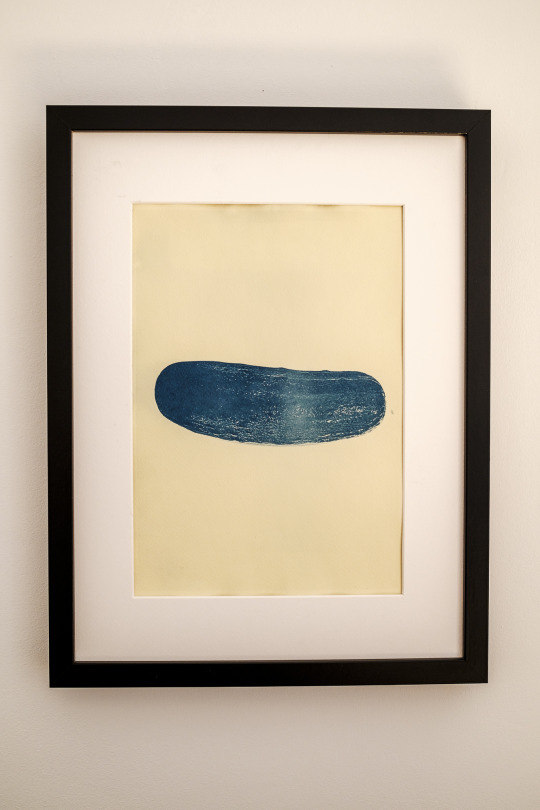
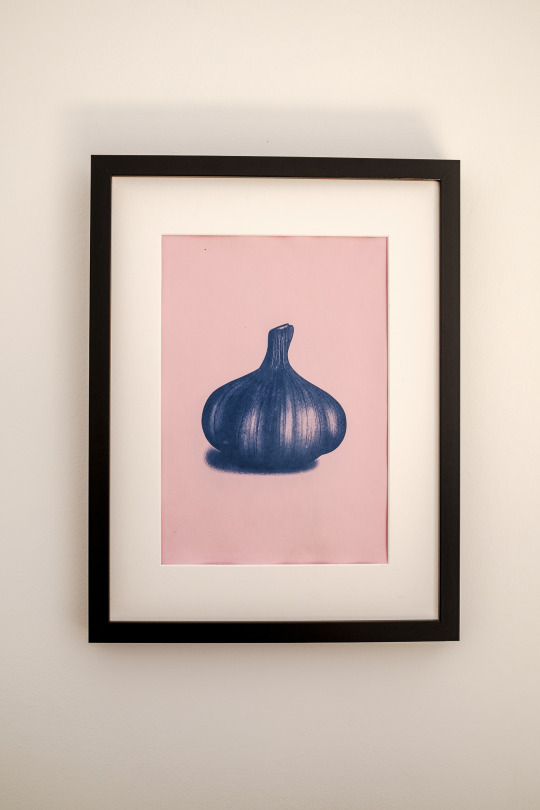
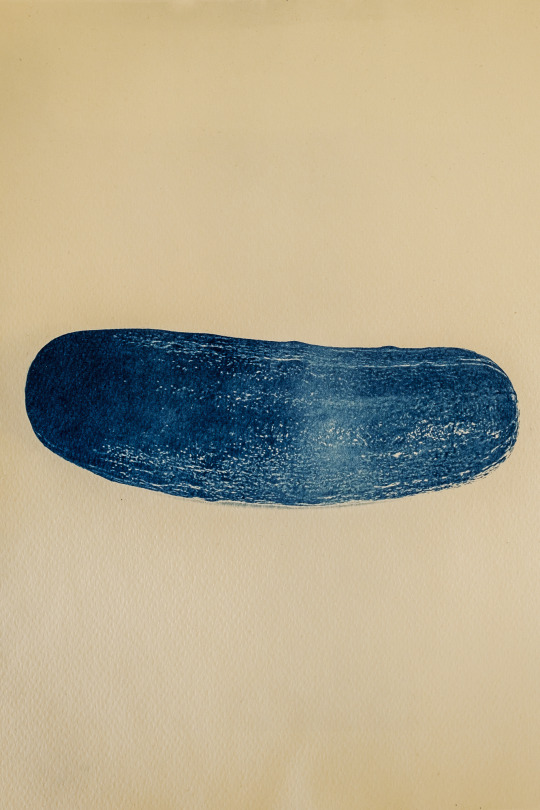
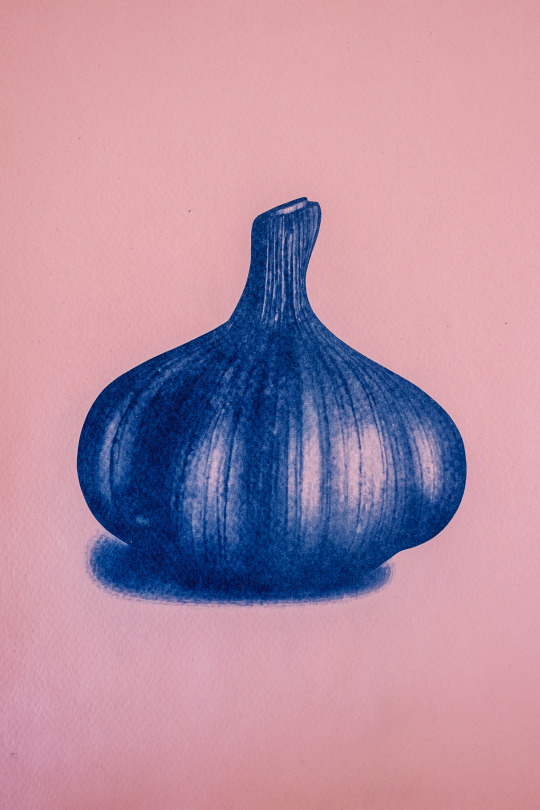
I wanted to celebrate with these two prints that I made, a long history that jewish people, garlic and pickles have. You can purchase these print via my Etsy shop.
And here's the history:
Already in ancient times, garlic was a central part of celebrating Shabbat. The Talmud devotes several passages to talking about garlic, explaining that it is a key part of Shabbat meals. “With what does one delight in the day of Shabbat?” the Talmud asks, recording an answer provided by Rav Yehuda, son of Rav Shmuel bar Sheilat, who recalled the words of his teacher Rav: “With a dish of beetroot, and a large fish, and heads of garlic” (TalmudShabbat 11b). Elsewhere, the Talmud refers to Jews who celebrate Shabbat as “garlic eaters,” so closely identified was Shabbat dinner and lunch with this fragrant vegetable. (Talmud Nedarim 31a)
Even later on, in the medieval times, the conncetion between jews and garlic was quite close. In fact, it helped the community to survive! In Istanbul, when Jews avoided the plague during a terrible epidemic, it was said that the virus did not penetrate the Jewish area because of the smell of garlic. Jews hung bulbs of garlic outside their doors to ward off the plague as a talisman and sign of good luck. The food historian Gil Marks adds: “Historically, the addition of garlic was among the typical Jewish touches that enhanced local dishes. In many cultures, the presence of garlic marked a dish as Jewish.”
In Germany, in the towns of Speyer, Worms and Mainz were home to large, vibrant Jewish communities. A popular acronym for these areas took the first letter from each town – S, W (which is written with a double “U” sound in Hebrew) and M – echoed the Hebrew word for garlic, shoom. The area was known as Kehillas Shoom (or SchUM) – the community of “Shum”, or garlic in Hebrew.
So identified were German Jews with garlic that some anti-Semitic images persist from the Middle Ages and Renaissance, depicting Jews holding or posing with bulbs of garlic.
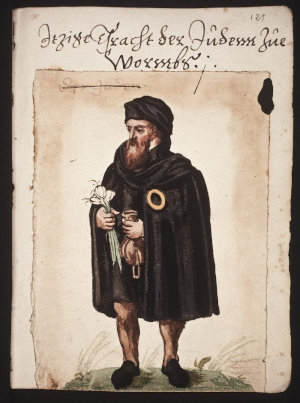
But jews and pickles go back for a long time too. Eastern European Jews brought their pickle-making traditions to America in the late 19th and early 20th centuries and made it famous there. Pickled cucumbers were an important part of their diet due to the need for preserving food in harsh climates in Eastern Europe, where was a common practice to collect and preserve pickles in order to survive winter. Everything could be pickled, from lemons to carrots, with varying degrees of culinary success.
Some took the cucumber, a cheap, accessible vegetable, preserved it in the spring to make them last through the winter and feasted on it throughout the year. Some of those people were Jews and thus the Jewish love affair with pickling began, as a way of keeping vegetables hygienic and healthy.
Fermantation itself as has a biblical orgin in various places. Perhaps the best-known early reference to fermented food is the Passover story in Exodus (12:39): When the Jews were "thrust out of Egypt, and could not tarry," their dough could not rise (through fermentation). We know this unleavened bread as matzo. But when they left Egypt, after some time, their longing for these goods came up: "We remember the fish which we were wont to eat in Egypt for nought; the cucumbers, and the melons, and the leeks, and the onions, and the garlic” It’s likely that the cucumbers mentioned by our Jewish forebears were pickled in some way. Ancient cucumbers tasted extremely bitter and the ancient Egyptians “cooked” their cucumbers by lightly fermenting them. The resulting pickled vegetables were slightly alcoholic, and were seemingly eaten for their mind-altering properties.
#jewish#jumblr#print#pickle#garlic#organic#food#fermentation#pickling#tradition#eastern europe#delicacy#deli#garlics#onions#cucumber#pickles#cyanotype#judaism#jewish history#food history#etsy#sale#art#cyanotype print#sunprint#original#decoration
178 notes
·
View notes
Text
Lights, Camera, Chaos | 1 | Todoroki Shouto / Reader
Summary: You and Shouto are forced to make your first televised appearance as a couple. What starts as an embarrassing invasion of privacy completely upends itself once you realize just how cutthroat the world of reality TV can get.
Tags & Warnings: Reader uses she/her pronouns, Quirkless Reader, Pro-Hero Shouto.
Part of the Pretty Boy Summer collab! [cross-posted on ao3]
-/-/-/-/-/-/-/-/-/-/-/-/-/-/-/-/-/-/-/-/-/-/-/-/-/-/-/-/-/-/-/-/-/-/-/-/-/-
Being the partner of a pro-hero was the kind of thing that should really come with an instruction manual. And emblazoned on uncoated paper stock beneath chapter one, the golden rule that nine of ten couples managed to break: keep it on the down-low.
Those who didn’t faced the consequences— particularly civilians.
Their faces were ultimately the ones that got splashed across the front page of every gossip-rag in Japan. They became public pariahs, their names repeated ad nauseam on the news, whispered with glee in hair salons and social clubs. In the story of their life, everything became forfeit to the public— their friends, their profession, their dating history, their homes. All of it.
Now, for nearly three months, you’d been one of them. At the end of the day, that was the noodles’ fault, really.
The summer after culinary school, you’d scored your first full-time role, working as the head chef in a small noodle shop just a few blocks from your college campus, at the edge of the city. The owner, Okuda-san, had been in business for years, but the dreams of grandeur that had brought him to central Mustafau as a young man had long since been struck by reality. Though the quality of his meals had never diminished, he’d vastly scaled back his operations over the last ten years— gone was the opulent restaurant in the center of downtown with its sleek metallic architecture and warm ambient lighting. Gone too was his wife, or so you suspected, based on the mutterings you could pick up from the front office, when business ran slow.
The day you met Shouto, the rain had been coming down in sheets, blurring the windows and filling the reception area with a soothing white-noise as you oversaw reservation bookings, dinner preparations and engaged in a small bit of gossip-gathering on the side. It was that same rain that had led you to warn him about the biodegradable styrofoam that his takeout was packed in, and offer the restaurant’s tiny enclave seating to avoid having his meal ruined by the deluge. You’d shared polite conversation— mostly offering tips for balancing buckwheat dough to make proper soba noodles.
Over time, the street in front of Okuda-san’s little shop had become a well-worn patrol path for Shouto’s agency. Conversations turned to texts, and invitations out with his friends. After an unhealthy amount of pining, you’d finally steeled your nerves enough to ask him on a date— an awkward but effective kickstart to almost two years of the best relationship you’d ever had.
There truly was no protocol for having such an intimate piece of yourself revealed to the public, to millions of your partner’s diehard fans. There weren’t words to describe the moment you first laid eyes on the incriminating photo that had started all of this: the two of you, sharing a kiss on the way up to your apartment. Your longing, exacerbated by Shouto’s tedious travel schedule had faced off against your building’s perpetually-slow elevator doors and came up short.
One grainy picture, posted to one account incited a slew of Internet detectives, stealing your anonymity in a matter of hours.
At the very least, you’d been blissfully unaware at first— overlooking the increasing stares from the diners at Okuda-san’s, and glossing over the fact that the cab driver knew your name on the way home. You’d remained blissfully ignorant up until arriving home to find Shouto on the doorstep, still in his costume. He’d quickly shepherded you up to your apartment and barricaded the door. In full pro-hero mode, he’d guided you through the essentials to pack in a duffel bag, and then quickly brought you back to his, to wait out the full extent of the madness.
The worst of it was concentrated in that first two weeks. You’d been unable to turn on the TV without hearing the diminutive nickname the media had chosen for you— “Noodle Legs”— coupled with the same clip of Shouto guiding you up the steps into his high-rise building, over and over. Unfortunately, your legs had been wobbling, as the full magnitude of what was happening had finally begun to set in. In those first days, you’d sequestered yourself in the guest room with the blinds drawn, the drone of the TV only semi-effective against the catastrophizing taking place in your mind.
The public had judged your relationship with Shouto and you clearly had not met expectations. It shouldn’t have been a surprise. Even a decade on from the war that had rewritten the operations of superhuman society, competent wasn’t a word that paired well with Quirkless.
As the media storm raged, you had never seen Shouto so upset. In the first few days, his schedule was particularly erratic, his whereabouts always announced by text and sticky notes left on your door, or the bathroom mirror in tight, neat script. Often, he was out amidst the public, speaking to media outlets on his own, trying to stem the influx of public opinion about you that had become the nation’s topic de jour. As you slowly began to emerge from your cocoon of solitude, you saw just how oppositely this ordeal was affecting him.
When he was home, Shouto paced, relentlessly. He completed a book of Sudoku puzzles as you absently cooked enough udon to feed a small army— or at least four of his pro-hero friends. Each night, he scarcely settle in on the couch next to you before noticing a stray sock or a flickering lightbulb, some small thing to put right. Nothing was enough, anymore, and even as you asked him to come to bed— his bed— he only ever seemed to sleep on the couch, if at all.
After nearly a week, his mania and your melancholy finally collided, spectacularly. You could still remember the whisper of the paper against the hardwood, as it slid under the bedroom door, late that night. Nearly two pages offered a handwritten letter apologizing for the upheaval of your entire life, and his absence in the aftermath. The third carefully recorded the plan he’d been building to mitigate the fallout, mentioning the friends he’d enlisted to help him and proposed ideas for a manufactured scandal, enough to take the limelight off you. That moment of shade, he argued, would allow you to distance yourself.
“I promise to help you establish a future that will make you happy.” the letter concluded, “And I understand, if that future no longer includes me.”
It was carefully-worded, largely self removed and so quintessentially Shouto that it nearly broke you all over again. Not much about your future was determined that night, apart from one, indelible truth: you didn’t want a future without Shouto in it. If that meant you’d have to face the public— the cameras and opinions and bigotry— so be it.
You’d casually perused enough gossip magazines to know the general strategies that hero & civilian relationships used, publicly. Some couples went on luxurious (sponsored) vacations, their devotion shamelessly showcased through glossy magazine spreads and corny ‘What’s in Our Suitcase?’ Q&As. Others used their moment in the limelight to launch one partner’s passion project — a private art studio, a taproom, a crossfit gym— often trendy, always overcrowded and never necessary public infrastructure.
The rest wrote memoirs. So. Many. Memoirs. You’d just finished “Catching the Copycat. — How I Fell in Love with Phantom Thief” earlier that month, and it wasn’t half bad. Amidst the unending slew of public attention and the realization that you were going to have to market yourself somehow, the idea of writing a novel was contenting. At the very least, your partner’s versatile Quirk meant there was no end to the pithy puns you could come up with for a title.
And then, Shouto’s PR team put out a press release announcing that the two of you would be starring in the next episode of Split Shift— the Hero Network’s one and only reality television program.
‘Think you’ve got what it takes to be a hero? Think again!” announced its pithy tagline, in the promotional packet,’ Each week, Split Shift lets its viewers experience a day in the life of the nation’s top defenders, exposing their personal sides, through the eyes of their inner circle!.’
The two of you had tried to fight it. Oh, how you had tried, your combined efforts quickly spawning endless hours of email chains. But Shouto’s public relations team was relentless— apparently, the clamor of the public for more details, photos, evidence of your leaked relationship was stronger than any villain in the known universe. And without it, they warned, Shouto’s rank in the heroics charts was severely at risk.
“I’m sure you’re aware,” Omori Mika, Shouto’s head of PR, explained, fingers flying across her keyboard as a window of metrics popped up, “a significant portion of Shouto’s fanbase finds him anywhere from “considerably” to “highly” attractive. Early this year, he dethroned Best Jeanist to win Quirk’d Magazines’ “Hottest Hero Alive.”
“Oh, yes— well deserved.” you nodded, sparing a glance to your own well-loved copy, resting on the coffee table. The cover-shot had really captured his intensity, the haunting contrast of his heterochromatic gaze in low lighting.
From the other side of the couch, Shouto cleared his throat, and you found yourself impishly delighted by the fact that he refused to meet your eyes.
“Why does that matter?”
“Because that faction in particular wants to know — why her?” Mika made a brief gesture towards you as she expounded, “Why, out of every person in the nation— the world, even— why is she the one you chose?”
Shouto blinked, glancing between you and the laptop.
“Do they want a list? I’d have to ask Midoriya for—“
“—evidence is the name of the game, Shouto.” Mika broke in, “Photos, maybe, but what people really want is footage.”
“Footage that we have to get by being publicly humiliated, got it.” you sighed.
A notch appeared between Mika’s perfectly- plucked eyebrows.
“I know you’re both unhappy about the booking, but the Hero Network is the best platform to showcase Shouto’s capabilities. The nature of the show won’t just remind people why they trust him— it’ll show that he’s chosen a capable and resourceful partner, as well.”
You flushed and averted your gaze. Capable and resourceful were just about the last things that you were feeling, at the moment.
“And honestly, Split Shift is tame in comparison to some of the shows that have been asking for you.” Mika began to flip through her color-coded planner, “Let’s see… Quirktastrophe, Save my Love Life… oh, you’re lucky we didn’t put you on Zero to Hero, I hear that host is a real piece of work, off-camera…”
“Message received.” Shouto intoned, cutting off the diatribe. You moved your legs enough to allow him to scoot over, leaning forward to minimize the chat window and zoom in on a contractual document, written in a font size in the single-digits. He met your eyes
You took a deep breath and sealed your fates with a nod.
“Where do we sign?”
The devil worked hard, but apparently the scheduling team for Split Shift worked harder. Less than a week later, the two of you were arriving at the studio at the crack of dawn, for what promised to be a grueling day of filming. The process began two blocks before the filming lot, a two-man crew driving out to meet in an adjacent parking lot. You and Shouto were each asked to step out of the car in order to have a microphone pack strapped and secured beneath your clothing. They also hooked a small portable camera to the dashboard, to “capture your authentic reactions to arriving on-set.”
In a mutual act of defiance, you and Shouto remained dead-silent for the remaining two blocks. It was a welcome respite, especially given that it seemed those silences would be few and far between for the rest of the day.
Two steps out of the car and you were being accosted by a human gale-force. She arrived in a cloud of cherry-scented perfume, and wasted no time in handing over the two smoothies she was carrying. The badge pinned smartly to her dark blazer read “Noujuu Yōko”.
You’d just barely opened your mouth to offer a ‘thank you’, but the woman barely spared a glance before she turned and circled a finger in the air to follow.
“You’re seven minutes late.”
“Your crew was delayed and there were a number of road closures en route.” Shouto fell in line, his cooler hand lacing with your free one, “We weren’t—“
“—I sent a reminder email at 2:45 AM with these details. Your coordinator should have shared them.”
You watched as a notch appeared in your partner’s brow, a subtle display of his annoyance. Before he could retort, you broke in with a small laugh that felt as awkward and forced as it sounded.
“Sorry about that.” you said, “This is all… very new.”
You didn’t receive a response, nor at this point were you particularly expecting one. Avoiding the wires criss-crossing the asphalt while keeping up with her brisk pace was taking enough effort, anyways. Unfortunately, an experimental sip of the smoothie in your hand revealed that it tasted like chalk.
“Don’t feel the need to apologize.” Shouto murmured, as you slowed your pace. This close, notes of mint and jasmine stood out in his cologne as he leaned over to murmur to you, “She’s just high-strung. They can film and record as they like, now— I’ve already seen a camera following us, from the right. They’re looking for reactions.”
“So, no public meltdowns— got it.” you smiled weakly, a chill going up your spine at the prospect of indirectly being ‘on-air’.
Yōko led the way back to the first of the sound stages as she explained that Split Shift was filmed in a “psychologically-backed” sequence. The core of that process was candid footage, occasionally guided by interviews.
“You’ll be interviewing throughout the day, both separately and together.” she explained, at the door, “At midday, we’ll have a thirty-minute lunch, and a touch-up with hair and makeup. The afternoon will then be dedicated to wrapping up the heroics case.”
“The… what?” you asked, glancing at Shouto, “Is there something you’re supposed to look into?”
“Not that I am aware of.” Shouto said, “Although I assume, based on the increasing number of cameras that have tracked us here, that this is meant to be some kind of dramatic twist.”
It took you a moment to begin to spot them— angled around corners, hidden in the shrubbery and eaves of the soundstage. There was even a drone flying overhead, high up enough to muffle the whine of its motors. Apprehension bloomed in your chest, counting at least fifteen cameras, knowing there were likely more.
The tone Shouto adopted was pure apathy— but you knew it as a defense mechanism, to hide the anger he hated to show.
“Is there a particular direction you’d like us to face, to express our shock?” he said.
Yōko’s chartreuse eyes narrowed in a silent declaration of war.
“This way will be fine.”
In the next instant, a loud metallic screech made you jump. Whirling around, you realized that the garage door of the warehouse was opening, and although you couldn’t see much through the gloom, the sun’s rays did catch off another two camera lenses, at least.
“We’ve made a few changes on set.” Yōko had to raise her voice to speak over the shuffle of the film crew as they filled in the space, the descending screech of the drone, “Audiences used to prefer viewing the world of heroes at street-level, through the eyes of those they loved most. Now, they want to experience it, for themselves.”
You weren’t looking at her, though, or any of the multitudes of cameras. Instead, your gaze was focused on the mannequin angled in the center of the sound stage, and dressed in a disconcerting blend of lycra and tactical gear— specifically an all-too-familiar vest and utility belt.
Yōko’s voice rang out behind you, sending a chill up your spine as the full scope of what you had gotten yourself into began to click into place.
“So, [Last Name] [First Name]. Are you ready to become a hero?”
#todoroki shoto/reader#prettyboysummercollab#todoroki shoto#bhna x reader#mha x reader#beloved: shouto
162 notes
·
View notes
Text
unfortunately after replaying disco elysium i am now considering the economic and political implications of ISAT's world so i'm going to ramble about it now
specifically in vaugarde.
firstly with dormont housing multiple shops and mirabelle mentioning dating *companies* and expensive earrings. market economy, possible capitalism. SAD!
then "defenders" existing as either a profession or volunteer position (i assume profession due to it being referred to as a "job" and the fact that you have to take "defender exams". speaking of which vaugarde seems to place a lot of emphasis on education which checks out culturally but it's probably politically important too so jot that down) and 'protecting [their] neighborhood, [their] city" from robberies at worst, with them usually helping with civil issues like rescuing cats from trees or helping old men with bags. is isabeau an ex cop or an ex social worker? is it both? perhaps defenders are citizens militias?
and the king targeting a house of change rather than any other particular form of government. is mirabelle a simultaneous college student and bureaucrat? or are Houses of change simply instances of government that provide education/food/body craft/healthcare to all, with "housemaiden" being a catch-all term for those who reside in them? furthermore, under the assumption that Houses DO constitute Vaugarde's government (again assuming that there is a government and they're not... like... ancaps with defenders existing as privatized policing institutions), are head housemaidens something like representatives or legislative bodies in a confederation? do you vote for head housemaidens, or are they simply chosen? promoted? in which case, by whom?
and then there's the way the king talks about monarchist ideals in the context of vaugardian society, which is of course NOT a monarchy.

*in vaugarde*? was vaugarde at one point a monarchy before possibly undergoing a revolution? "against the will of the people" -- perhaps this is a hint at a general *distaste* for monarchism among vaugardians... is that part of its cultural reverence towards Change?
WHAT IS THE HIERARCHY UNDER WHICH VAUGARDE EXISTS IN ORDER FOR THERE TO BE STORIES ABOUT "LORDS" GUARDING "CASTLES"?! since vaugarde is not a monarchy, is the status of a lord residing in a castle purely economic? is lord josephandre a lackey of capital?! is the cursing of chateau castle Defender propaganda?!!?! or-- or-- maybe the cursing of chateau castle is some kind of historical piece! it's long running, so maybe it contains cultural relics of a bygone era (possibly monarchist in nature)??!!?
also, notice how during his friendquest, isabeau points out that jouvente has "more than one house" as a way of emphasizing how big it is:

sure, it could just be that bigger cities need more resources and public service, but still.... it tells you something about House jurisdictions. maybe about representatives.
and the way mirabelle describes euphrasie:

the head housemaiden of *dormont*. the town, not the house. this all but confirms that towns/cities are ruled individually by their own House(s, in the case of larger cities)!
while not *all* vaugardians follow the Change belief, it seems pretty likely that the country itself is ruled by it.... boy, they sure are lucky that the House of Change is so welcome and opening to everyone regardless of belief! (though it's implied proselytizing might be encouraged for its members when siffrin tells mirabelle he might want to go on a pilgrimage.)
so TL;DR, in MY AMATEUR OPINION,
vaugarde is a confederation of theocratic city-states with a social-market economy and no central governing body.
i just thought that was interesting.....
#in stars and time#isat spoilers#isat euphrasie#isat isabeau#isat mirabelle#mirabelle isat#isabeau isat#euphrasie isat#long post#vaugarde#dormont#vaugarde isat#dormont isat#why did i do this..........
114 notes
·
View notes
Text
DATV Mini-Rant about the lack of Lyrium Potions in this Game
A small thing that immediately made my stomach drop when playing DATV was the fact that there are no lyrium potions.
I did an elective on game design in university and chose Origins as my game of choice for my final essay because I always loved how much the game incorporated the world/lore in its game mechanics! Call it pathetic or sad (I won't blame you lmao) but this series was the first video game that engaged me so deeply with its story-telling that I wanted to dissect it. That's why I'm focusing on the lack of magical cocaine in a fantasy game series.
Lyrium is a substance that serves as a game mechanic and a major lore/world-building element. It's use is essential if you play the game as a mage or have party members that are mages - it replenishes mana in game, its use is central to being a mage within the story (harrowing, rituals, etc...), and it's a major export/plot relevant resource that is important to the world at large.
So imagine my surprise when I boot up DATV for the first time and there's no lyrium potions as a mage character. My main interest in the game series was for its lore and story (RIP) so I didn't look too hard into developer interviews or videos about the combat itself - it would either be good or bad, but that wasn't my main draw to the game. I kept playing, wondering if I would ever unlock another slot for potions, perhaps, but then it was abundantly clear that it wasn't the case.
It's a small thing, but popping a lyrium potion mid-combat has the same effect that hearing people say 'Maker's breath' and 'Thank the Maker' does. It's this little bit of world-building that reminds me that I'm playing a Dragon Age game. It's not just a 'mana potion' or some other glowy blue magic vial...it's this substance that's important to the world and that has a reason to be there beyond rejuvenating my mage.
It's the major export of Orzammar -> the pillar of its economy.
It's the substance that allows waking mages to enter the Fade -> it allowed me to save Connor Guerrin with the aid of other mages.
It's the substance that the Chantry uses to leash it's templars through addiction -> an addiction I encouraged Cullen to overcome in DAI.
It's the substance used in the Rite of TRANQUILITY.
It's the substance that allows my warrior character to take on the templar specialization in each game -> Alistair and Ser both talk about lyrium and its relevance to training (in DA2 you just do it lmao)
It's the substance burned into Fenris's skin by Danarius.
It's the literal blood of the Titans -> lyrium veins are literal veins (such a cool design choice in DAI to make them look like blood capillaries!)
And all the time in DAO, DA2, and DAI my mage characters were downing this substance like there was no tomorrow.
Even though the combat changed in DA2 and DAI they still kept lyrium potions for mages. Even though they simplified herbalism from DAO in the next two games, they still required the player to interact with the world and find the ingredients for these potions. It was this gameplay mechanic that linked the player to the world -> I know that I need blood lotus to set shit on fire, elfroot for healing potions/lyrium potions, etc... It was cool game design, having game mechanics and lore interconnected like this.
(Not saying that picking up dozens of elfroots was fun or the best game design, btw -> but it's just an example of how they linked the world and game mechanics together, and I like the intent behind it! Cool design does not equal effective design lmao)
What do we get in DATV? No lyrium, whatsoever, just healing potions.
Potions we don't even have to work to find or get crafted! Just break some green shit and there it is! We don't pick up ingredients or discover unique flora to each of these Northern Areas for our own use. We don't loot potions or ingredients from corpses, sacks, boxes, chests (etc...) to replenish our own stock. A healing potion in this game is not a potion you craft, made from ingredients you found, it's a button I press on my controller. It's lost that immersive link - especially when your companions can toss another one at you while being effectively immortal in combat.
The only new flora we hear of is Broma's Bloom which I did like the lore behind! It's used in dye to colour the Warden's armour and its growth is a sign that the damage of the Blight is lessening. I love that! That's a cool bit of lore! Especially since it's named after Andraste's mother in a land that is supposed to be extremely religious. Geographically unique flora and fauna (biodiversity) is just as important as architectural design when designing an area - DAI did this amazingly well with the different creatures and plants we could run into in each area!
The first time we meaningfully talk about lyrium is when we go to Kal Sharok for the first time - a decent amount of game time since the beginning of the game, depending how fast you play. And then, when we get there, the lyrium looks like a bunch of crystals from a 'grow your own lyrium' kit. The absence of lyrium from the game world and mechanics is something that was very hard for me to overlook considering its importance to every previous entry. Especially since in this game we address the fucking Titan's and what the fuck happened to them.
Just...imagine playing a mage in Dragon Age and not using lyrium?
This game is a death of a thousand cuts - so many small, meaningful world-building elements and mechanics brushed off - before fucking godzilla comes along and nukes it all with the handling of the main story/lore.
#bring back fictional cocaine aka lyrium dust!#on the subject of lyrium related drama -> why can't i tell Cullen he's drinking dwarven god blood?!#my man would never have lyrium again if he knew that lmao#literal templar blood magic and I can't tell anyone?? >:(#first thing i did when i finished that dlc was to run to Cullen to see if there was any unique dialogue#lyrium visual design in this game was awful - why does it look like something I grow from a kit you could buy? why do I want to lick it?#looks like a ring lollipop - i loved the dai blood veins design#what the hell happened to the titans too?? 'baby's first titan' - why is it so empty?#the one in DAI had a little SEA inside it - not to mention clouds / light source / plants / homes / birds etc...#“it's angry" - and very empty and kind of lame when u compare it to the descent dlc#lyrium#should I do a my meta tag? probably lmao#datv critical#dragon age the veilguard#bioware critical#veilguard critical
103 notes
·
View notes
Text
On Humanity, Tenets and Convictions
The V5 corebook does an appalling job of explaining how these mechanics fit together and what they represent; I don't think even the Players' Guide really hits it in the terms that are needed. I don't want to jack the excellent post by @vixensdungeon but nevertheless, the urge to explain things on Tumblr dot Com, the App and Website, is very strong in me this morning.
Humanity itself is objective. Each notch on the scale has defined, concrete mechanical impact on what the character can and cannot do, and these are consistent no matter what the character thinks or believes or feels, and these are universally applicable, no matter who your character and my character and her character might be. At one end of the scale your character is Literally Unplayable; at the other, they are more human than most humans, certainly than most RPG protagonists, and might as well be unplayable considering the role of the TTRPG as societally unacceptable behaviour simulator (cf. Power Kill, as usual).
Tenets are subjective but shared. They are the ethical rules on which our story operates: the things that we have agreed should provoke a moral crisis in our vampire protagonists. For Humanity loss to occur, you need these cues and triggers, these "thou shalt not" rules, and for that central fact of the game - that unlife isn't life and living it makes you less of a person - to come up in play, they need to be rules your character is going to break.
Without Tenets you have no idea what makes Humanity vulnerable and precious and worth saving; there are not many universal, objective, "doing this always gives you a Stain" rules in V5. You have to do the work here. The game needs you to decide what's horrific in order for its personal and political horror to exist at all. You cannot skip this. You cannot rely on a universal morality that isn't there and isn't shared to dictate Humanity loss. The game needs you to think about these things.
Convictions are subjective, and entirely personal. They are the "but thou must!" imperatives which allow your character (and only your character) to justify breaking the Tenets and retain a grip on their Humanity. They create the opportunity for your character to resolve their moral and ethical qualms in their own favour every so often; to stop the process of play being a nihilistic rush down the Humanity scale. VtM works if you all speedrun down to Humanity 4 and act like the usual "chaotic evil until proven otherwise" TTRPG protagonists but it aspires to make you think and feel things about that and the rules are set up to demand you meet that aspiration.
If you want a vampire game where the state of being a vampire isn't a moral issue, can I recommend Vampire: the Requiem Second Edition? A game with an objective, universal definition of Humanity and the threats to it as "experiences that remind you you are not a human being any more," and the more fundamental that reality check is, the less likely it is a character will retain Humanity when confronted with it? It's extremely tidy and doesn't demand that you establish and interrogate any of your own principles. It's not moral "degeneration," it's experiential "detachment," and that hits very differently.
Also, none of this is to do with Lines and Veils. Tenets are rules you want your characters to break. They are the substance of your morality play. They will come up in play and they will do so often. Lines and Veils are rules about what you as a player do not want to have to experience at the gaming table and they are not supposed to come up/be directly narrated. One of these things is part of a core gameplay function and one is a safety tool. Know the difference.
65 notes
·
View notes
Text
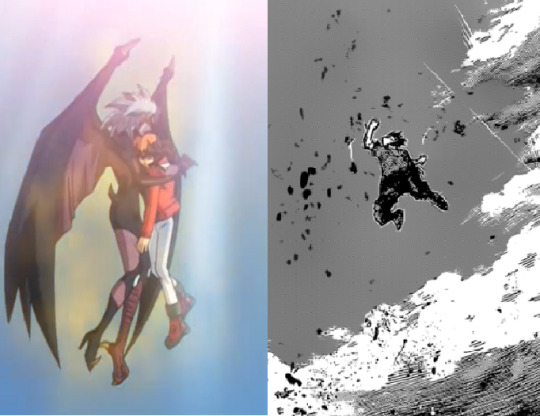
SHIGARAKI VS. YUBEL: HOW TO SAVE YOUR VILLAIN
The failure of Deku to save Shigaraki isn’t just a tragic conclusion for Shigaraki’s arc, it’s also My Hero Academia failing as a story. When I say the story failed, I mean the story has failed to answer any of the questions it asked its audience. It’s themes, character arcs, everything that communicates the meaning of the story to the audience is no longer clear.
Saving Shigaraki was the central goal of not only the story itself, but the main character Deku. By failing in its goal you can’t call this a good ending. In order to illustrate why this goal of saving the villain is so important to both Deku’s character and the central idea of MHA, I’m going to provide a positive example in Yu-Gi-Oh GX were the main character Judai successfully saves their villain. One of these stories fails, and the other succeeds. I will illustrate why under the cut.
BROKEN THEMES = BROKEN STORY
When artists draw they have to consider things like perspective, anatomy, shading, light, coloring. Drawing has rules, and it’s hard to produce good art without knowing these rules beforehand. If I draw something that has bad anatomy, you can criticize me for that.
Writing has rules, just like drawing. The rules of storytelling are important because writing is an act of communication. You can write whatever you want, just like how you can draw whatever you want, but if you break the rules the audience won’t understand what you are trying to communicate.
When I refer to MHA as a broken story, I am referring to the fact that it has broken the rules of storytelling. As this youtuber explains.
“I guess we should first define what broke and broken even means in this context. Has the story turned into an unintelligible mess? Not really. Value judgements aside, the narrative is still functional and fulfills the criteria of being a story. So how can a story that still functions be broken? Maybe to you it cannot. But to me a story that is still functional isn’t enough. What I mean when I say MHA is broken is that it’s lost something crucial. A codifying style of structure, pacing and payoff that until a certain point was the core of its identity.”
I could launch into a long-winded explanation of what themes are, but for the sake of simplicity I like to define themes in terms of “Ask, and answer.” The author asks a question to the audience, and then by the end of the story provides an answer. The audience is also invited to come up with their own answer which prompts them to think about the story on a deeper level. The question both MHA and GX are asking both its main characters and the audience is “Can you save the villain?” with the additional complicated question of “Should you save the villain?” This post will detail how both stories go about answering those two questions, and more importantly why those answers matter for the story.
With Great Power… You know the rest.
My Hero Academia and Yu-Gi-Oh Gx are actually similar stories once you get past their superficial differences. MHA is a story with way better worldbuilding, compared to a society where everything revolves around the trading card game, and people go to school to be better at a trading card game.
However, if you get past that. They are both bildungsroman, stories about the main characters growing up into adults. They both have an academy setting where the goal is for the main character to graduate and enter the adult world. They are both shonen manga. GX is the sequel of Yu-Gi-Oh a manga that ran in Shonen Jump the exact same magazine as MHA. The biggest point of comparison is their main characters, who both start out as young and naive who are driven by their admiration of heroes. Deku is a fan of All Might who wants to become a hero despite not having a quirk, because he loves All might who saves everyone with a smile. Judai’s entire deck archetype revolves around “Elemental Heroes’ and later “Neo-Spacians” who are all based on popular sentai heroes like ultraman.
The central arc for both characters is to grow up. Growing up for both of them not only requires figuring out what kind of adult they want to be, but also what kind of hero they want to be.
Now I’m going to drastically oversimplify what a character arc is.
A character arc first starts out with the character being wrong. Being wrong is essential because if the character is right from the beginning, then there’s no point in telling the story. A character often holds the wrong idea about the world, or has some sort of flaw that hinders their growth. The narrative then needs to challenge them on that flaw. It usually sets up some kind of goal or win condition. That flaw gets in the way of a character “winning” or achieving their goal, so they need to fix that flaw first. If their ideals are wrong, then they need to think about what the right ideals are. If they’re too childish, they need to grow up. If they have unhealthy behaviors or coping mechanisms, they need to unlearn it and require better ones. Otherwise, that flaw will keep sabotaging them until the end.
I’m borrowing the word “win condition” from class1akids here because it’s an incredibly appropriate terminology. Midoriya needs to do “x” in order to win, otherwise this victory doesn’t feel earned. The “x” in this case is usually character development. As I said before, a story where the main character hasn’t changed from beginning to end feels pointless. Especially in Deku’s case, he was already a brave, strong hero who would charge right into battle and defeat the bad guys in chapter one, so him defeating Shigaraki in a fist fight doesn’t represent a change.
The story sets up not only “What does the hero need to do to win?” but also “How does the hero need to change in order to win?” A character either meets these requirements before the end of the story, or they don’t and usually this results in a negative ending.
MHA in its first half quite clearly set up both the final conflict of saving the villains, and also that saving the villains is its “win conditions.” The hero shouldn't be allowed to win without first fixing this flaw.
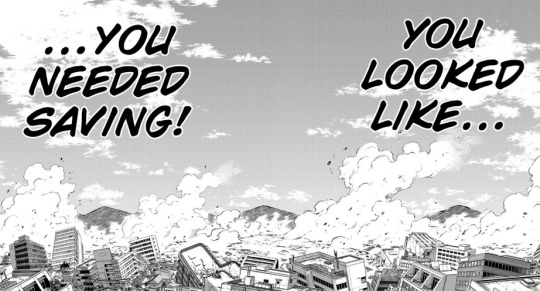
From this panel onward the central question Deku is forced to answer shifts from “Am I strong enough to defeat ShigarakI” to “Can I save Shigaraki?” However, much earlier than that All Might goes on to basically set up the win conditions of what makes the ultimate hero as someone who “Saves by winning, and wins by saving.”
All might: You can become the ultimate heroes. Ones who save by winning, and win by saving.
Therefore the story has set it’s criteria for what kind of hero Deku needs to become. If he wins without saving, then he’s failed to become what the series has set up as the Ultimate Hero.
Shigaraki and Yubel aren’t just narrative obstacles, or boss monsters to be killed like in a video game. They are narrative challenges, which means that the character can’t grow in any way if they don’t answer the challenge presented by the characters. They are villains who actively resist being saved, to provide a challenge for two heroes who define their heroism by saving others. The challenge they pose adds a third question to the story and the main characters.
"Can I save the villain?"
"Should I save the villain?"
"If I don't save the villain, then can I really call myself a hero?"
In other words the decision they make in saving, or not saving their final antagonist defines what kind of hero they are. In Deku’s case it’s even more critical he defines what hero he wants to be because the MHA is also a generational story, and several of the kids are asked to prove how exactly this generation of heroes is going to surpass the last one. The kids growing physically stronger than the last generation isn’t a satisfactory answer, Deku getting strong enough to punch Shigaraki hard is not a satisfactory answer, because we are reading a story and not watching a boxing match.
I’m going to focus on the last two questions though for a moment. Many people who argue against saving villains like Shigaraki argue he is a mass murderer and therefore isn’t worthy of salvation. However, the act of saving Shigaraki isn’t a reflection of Shigaraki himself, but rather the kind of hero Deku wants to be. It all boils down to Spiderman. In the opening issue of Spiderman, teenage Peter Parker is bitten by a radioactive spider and suddenly gains super strength, the ability to stick to walls along with other powers. However, being a teenager he uses these powers selfishly at first. He doesn’t feel the obligation to use his powers for other people, and therefore when he sees a robbery happening right in front of him he lets the robber go. However, because he lets the robber go, the robber then attempts to hijack a car and kills his Uncle Ben in the process. If Spiderman had stopped the robber then he might have prevented that from happening. He had the power to stop the robber, but he didn’t feel responsible or obligated to save other people. As a result Uncle Ben dies. It’s not enough to have power, ti’s how you use that power that reflects who you are, therefore: “with great power comes great responsibility.”
The choice to save Shigaraki actually has little to do with whether or not Shigaraki is redeemable, but rather how Deku chooses to use his power, and what he thinks he is responsible for reflects who Deku is as a person. Deku himself also clearly outlines how he wants to use his power, that One for All is a power for saving, and not killing.
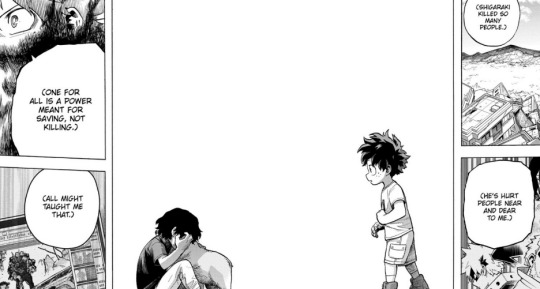
How he uses his power reflects Deku’s ideal in saving others, and therefore if he doesnt use his power to save, then he’s failed to live up to his ideals. It's not whether it's morally right to save a murderer like Shigaraki, but rather the way Deku wants to choose to use his power. It's about whether he feels the responsibility to save others.
Judai explores an incredibly similar arc to Deku. They are basically both asked what kind of responsibilities a hero is supposed to have, which is also a metaphor for growing up to handle the responsibilities of adulthood. As both characters start out with incredibly naive and childish ideas about what a hero is. Therefore realizing what a hero is responsible for is key to them growing as a character. However, Judai is different from Deku. In some ways he’s more like Bakugo. Judai is a prodigy who’s naturally good at dueling. He doesn’t duel to save others, but rather because duels are fun and he’s good at it. He’s very much like Bakugo, who admired All Might as a hero just as much as Deku did, but admired the fact that he was strong and always won rather than he saved others.
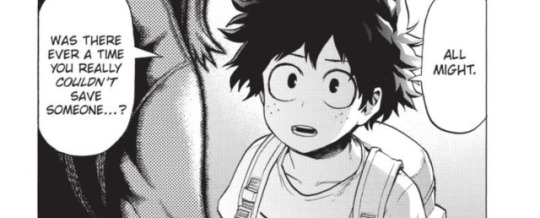
However, I would say both Deku and Judai are questioning what a hero is responsible for. They are both asking if they have the responsibility to use their power to save others. If they have to fight for other people, just because they have power. His first big challenge as a character comes from Edo Phoenix, who calls out Judai for not thinking through what it means to be a hero, and what responsibilities heroes carry. Judai duels because he thinks it’s fun. He will show up to duel to help his friends, but that’s because he’s the most powerful person in the group. Even then it’s because he finds fighting strong opponents to be enjoyable. Bakugo will beat up a villain, but for him it’s more about winning then if the action will save someone or not.
Judai is more often than not pushed into the role of being a hero, he doesn’t play the hero because he’s a particularly selfless person, and he’ll often avoid responsibility if not forced. He has power but no sense of responsibility and the narrative calls them out as a problem.
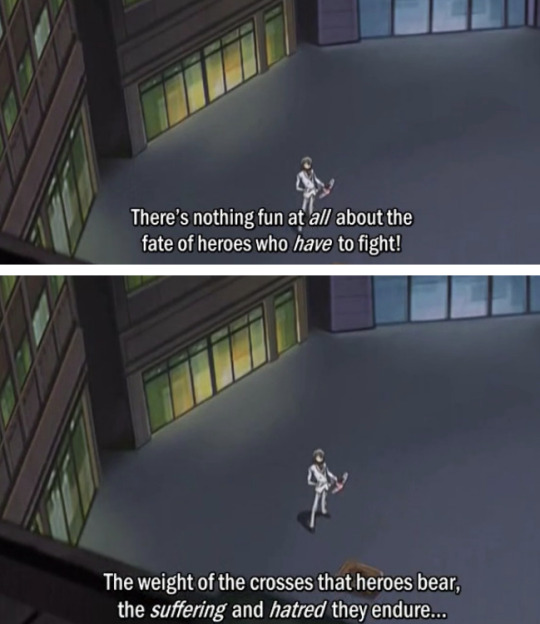
Edo: Can you even fathom that, Judai?
For Judai, he can’t understand the responsibility of being a hero. For Deku, he idealizes heroes so much he can’t understand that there are people out there the heroes have failed to save. These two callouts towards Deku and Judai are discussing similar because they’re both discussing where a hero’s responsibilities lie. Is a hero responsible for saving everyone? Is someone strong like Judai responsible for using their strength to help other people?
Judai’s arc continues into the third season where he’s not shown to just be naive but ignorant. He’s not just childish, he actively resists growing up because he doesn’t want to take on adult responsibilities.
THe same way that Deku just decides not to think about whether or not All Might failed to save people in the panels above. However, in Judai's case he's actively called out for his choice to remain ignorant.
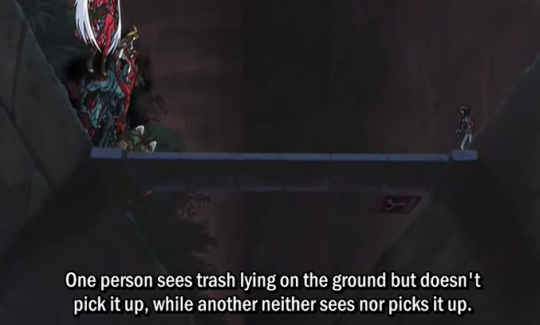
Satou: Now, which one is at fault? Judai: Isn’t it the guy who saw it, but didn’t pick it up. Satou: Not quite. If one is aware of the trash that fell, it may be picked up someday. But there is no possibility fo the unaware one ever picking it up. Judai-kun you are the foolish one unaware of the trash that has fallen. Judai: Are you calling me out for how I am? Satou: Your behavior towards me was atrocious. The worst was attending class only for credit, even if you were there you only slept. Judai: Yeah, I know. I was all bad, but it wasn’t that big a- Satou: It is important. You see, one by one, the students inspired by your attitude were losing their motivation. Now if you were a mediocre duelist, then this would not be an issue. Satou: However, you are the same hero who defeated the three mythic demons. Every single student in the academy admires you. You should have been a model for this academy. Judai: Me, a role model? Are you kidding? I just do whatever I feel like doing. Satou: Great power comes with great responsibility. Yet, as you remain unaware of that, you’ve spread your lethargy and self-indulgence.
seems like a minor issue, but look how Judai responds to the accusations. “I just do whatever I feel like doing.” Satou is arguing that Judai should pay attention to the influence he has on others because of his power, because how he chooses to use that power affects others. However, Judai chooses to actively not look at the consequences of his actions because he doesn’t want to take on that level of responsibility, and therefore he’s looking away from the trash.
While it seems like it doesn’t matter in Satou’s specific example, not thinking of the consequences, or how you use your power can have unexpected consequences. Spiderman doesn’t feel like it’s his responsibility to stop a bank robber, and that bank robber shoots his uncle. You could still argue it’s not Spiderman’s responsibility to stop every crime in the world, and I guess no one owes anyone anything from that point of view - but Spiderman failing to act responsibility had the consequence of directly hurting someone else.
Spiderman has to live with that consequence because it was his own Uncle that was hurt. This is where we really reach the duality of Judai.
In GX, Judai is, symbolically speaking, The Fool of the Tarot Deck, the Novice Alchemist — a person brimming with infinite potential, yet one who is also supremely ignorant, who walks forward with his eyes closed and often unknowingly causes harm in his great ignorance. In this, he is very much the embodiment of the faults we most commonly associate with teenagers — selfishness, recklessness, shallowness, a lack of dedication or empathy when it’s most needed. Like most people, he has good traits that work to balance out some of the above, but his narrative path through GX ends up being that of the flawed hero undone by his faults — and then that of the atoner, the repentant sinner. In his case, the mistakes of his teenage years are the catalyst for his growth from a boy into a man burdened with duty and purpose. Judai is someone with infinite potential, with great power, but also ignorant on how he should use that power, and that makes him an incredibly flawed hero who needs to learn how that power should be used.
Deku similarly exists in a society where heroes deliberately turn a blind eye to the suffering of a certain type of victim. Shigaraki’s speech heavily resmebles Satou’s speech about garbage on the side of the road.
Shigarali: "For generations you pretended not to see those you coudln't protect and swept their pain under the rug. It's tainted everything you've built."
Deku shares Judai’s ignorance, because he’s not only a part of a system that doesn’t even see trash on the side of the road, but he also worships heroes so much that he’s incapable of criticizing them. If Deku saw the flaws of heroes, but at first didn’t have the courage to speak out, but eventually gained the courage that would be one thing. However, if he doesn’t see the flaws of heroes, then the problem will never be fixed.
There are also consequences for both Judai and Deku failing to use their powers responsibly. These consequences take the form of the villains who came about because of all of society’s ignorance to the suffering of victims (Shigaraki) and because of the main character’s ignorance to their suffering (Yubel). Shigaraki and Yubel are also explicitly victims that the heroes failed to save, turned into villains who are active threats to the heroes.
Should I save the villain?
The answer is yes, because the decision to save is reflective of the kind of hero each character wants to be. Each story clearly sets up that Deku and Judai aren’t punisher style heroes who shoot their villains, they are being set up as heroes who save. Deku needs to “save by winning.” As for Judai, a big deal is made of Judai’s admiration for another character Johan who represents a more idealistic kind of hero. Johan unlike Judai is someone who duels with a purpose, something Judai outright says he admires because he’s empty in comparison.
Judai: Johan what have you been dueling for? See, it’s about fun for me… Well, for the surprise and happiness too. I guess I do do it for the fun. Sorry, I guess I put you on the spot by asking out of nowhere. Johan: What’s this about Judai? Judai: It’s nothing. Johan: I suppose there is one goal I have. Johan: Even if someone doesn’t have the power to see spirits, they can still form a bond with a spirit. That’s why I do it for people like him. [...] Johan: I'll fight for everyone who believes in me, and I'll do it with my Duel Monsters. Judai: I'm jealous you've got feelings like those in you.
Becoming a hero who uses their power to help others isn’t just a goal the story sets for Judai, it’s a goal that Judai sets for himself because of his admiration for Johan. Johan represents the idealistic hero Judai wants to be, but is also held back from because of his personality flaws. Johan represents the kind of heroic ideal that Deku is aspiring to be.
Johan’s ultimate goal isn’t punishing the wicked, but to use his power to save others.
Johan: Judai, it was my dream to save everyone through my dueling!
The story sets up the idea that it’s not enough for Judai to simply be strong, he’s also challenged to become a savior who uses his power to help others like Johan. Deku needs to “save by winning” and Judai needs to “Save everyone through his dueling.” However, Johan also adds another condition to what saving means. His idea of saving isn’t to defeat a villain, but rather his dream is to help connect spirits and humans together, even if there are humans who can’t see spirits. Johan doesn’t save people with the power of physical force, but rather the power of human connection.
Should I save the villain?
Here the answer is "Yes", because wants to become more like Johan someone who uses their power to help others not just for themselves. Then we reach the third question
If I don't save the villain, can I really call myself a hero?
It once again comes to power and responsibility. Heroes have great power, and they are responsible in how they use that power, if they use it irresponsibly then there are consequences. Shigaraki wants to destroy hero society, because the heroes irresponsibly use their power to turn a blind eye to everyone’s suffering.
People suffer when heroes fail to live up to their responsibilities. The entire conflict of season 3 is created by Judai failing to save Yubel. If Judai had helped Yubel when they most needed it, instead of abandoning them, then Yubel would never have been twisted by the light of destruction, would never have attempted to teleport the school to another dimension, would never have attacked all of JUdai’s friends.
These consequences matter. Deku can turn his eyes away from Shigaraki’s suffering, but let’s say a hero failed to stop a robbery, or rather he didn’t even try, and because of that his mom was shot and died in the street. Would Deku consider the man who failed to stop a bank robbery a hero? When Spiderman let a bank robber go instead of trying to stop him, was he being a hero in that moment? Both the stories and the characters themselves have defined heroes as people who use their powers to save others, therefore if Judai and Yubel fail to save their villains then they can’t be called heroes by the story’s own definition. Now let’s finally return to the question of "Can I save the villain?"
Was there ever someone you couldn’t save?
m going to start with Yu-Gi-Oh Gx as a positive example of how to save your villain. Gx works for two reasons. One, it’s established from the start that Yubel isn’t beyond salvation, and two, it makes it so Judai can’t win without saving Yubel. The conflict of the story does not end until Judai makes the decision to save Yubel. In some ways the writing is even stronger because Judai is directly responsible for the pain and suffering that Yubel went through that turned them into a villain in the first place. Yubel isn’t just a victim, they’re specifically Judai’s victim.
Yubel is a duel spirit who is also essentially Judai’s childhood friend. A duel spirit just like the kind that Johan wants to save. During their childhood Yubel got too overprotective of Judai, and started to curse his friends for making him cry or upsetting him in any way. Until everyone Judai’s age started avoiding him and Judai became all alone with only Yubel for company. Judai’s decision was to abandon Yubel at that time. He took the yubel card and shot them into space, hoping that being bathed in space rays will somehow “fix” what was wrong with them. I know that’s silly but just go with it. Judai abandoning Yubel had the unintended consequence of Yubel being subjected to the light of destruction, a corrupting light that subjected Yubel to years of pain. This pain literally takes the form of Yubel burning alive.
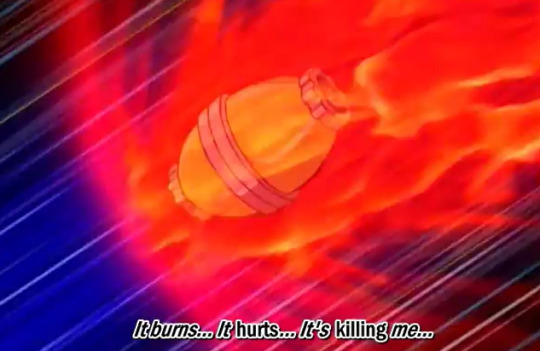
Yubel connected to his dreams called out for Judai every night, only for Judai’s parents to give him surgery that repressed his memories of Yubel causing him to forget them entirely. Yubel then spent the next ten years alone in space, continuously subjected to painful torture, with their cries for help being ignored.
"I was suffering even as you came to forget about me..."
Yubel is then met with the question of how can Judai treat them this way if they loved him so much? As from Yubel’s perspective, they’ve only ever tried to protect Judai, only for Judai to not only throw them away, but subject them to painful torture and ignore their cries for help. Judai effectively moves on with his life, goes to duel academy, makes friends while Yubel is left to suffer in silence all but forgotten. This is where Judai’s ignorance has serious plot consequences.
It’s not just the pain that Yubel endured that made them snap. It’s that their pain went ignored.
Yubel holds out the faint hope that Judai will answer their calls fro help until they finally burn up upon re-entry into earth’s orbit. At which point they’re left as nothing more than a single hand crawling on the ground. Yubel who cannot fathom why Judai would cause them so much pain, and then forget about them, convinces themselves that Judai must be causing them pain, BECAUSE he loves them.
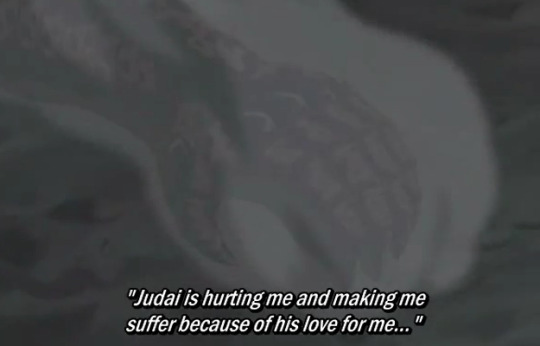
But you see, I couldn't possibly forget about you in the time that I've suffered...
Judai is allowed to move on with his life, to make friends, to spend the next ten years doing so while Yubel is subjected to ten years of agony. When they finally escape their painful torment, they see all the friends Judai has made while they’re left alone and forgotten. However, Yubel’s goal isn’t revenge. Rather, it’s to make Judai share and recognize their pain. WHich is why I said it’s not the fact that they were made to suffer, but their suffering is ignored. Yubel’s entire philosophy revolves around the idea that sharing pain is an expression of love, and that they and Judai share their love for each other by hurting each other.
"That's why I sought to fill all those linked to you, your world, with both sadness and anguish..."
For Yubel, making all of Judai’s friends suffer and Judai themselves suffer is a way of making them and Judai equals again. They want to show “their love” for Judai, but it’s more about forcing Judai to recognize the pain he’s caused them by forcing him through the same pain. Yubel’s philosophy of sharing pain is actually a twisted form of empathy.
They’re not entirely wrong either, that even people who love each other can cause each other pain, and that if one person is suffering alone in a relationship or the suffering is one-sided then there’s something wrong with that relationship.
Yubel: I get it now… You weren’t in love, with Echo. Yubel: No.. you may have loved her just enough to clear the conditions in palace for you to control Exodia, but the you didn’t truly love each other. Yubel: You were only unfairly hurting her, while you stayed unharmed. You wouldn’t suffer. You wouldn’t suffer. You wouldn’t be in pain. Amon: What are you getting at? Yubel: I’ve been hurt! I’ve suffered! I’ve been in pain. That’s why I’m making JUdai feel the same things I did!
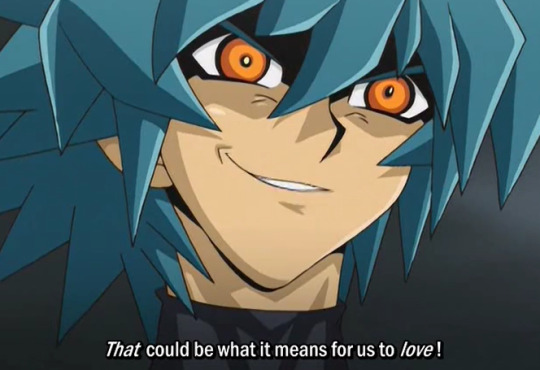
Yubel’s twisted theory of love, is a pretty thinly veiled cry for empathy.
They break out into tears when talking to Amon about the way they’ve hurt and suffered. They clearly state upfront that their goal is for Judai to recognize their love. One of the first things they say to Judai is a plea for Judai to remember them.
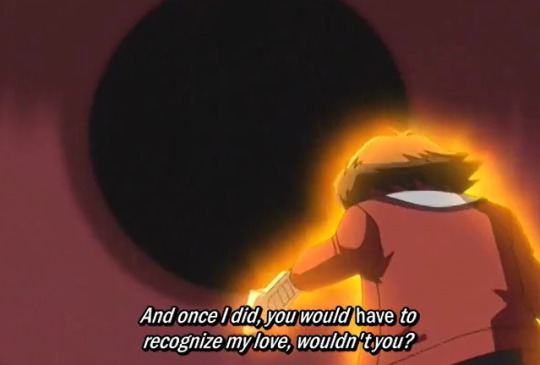
Yubel is presented as a very human character suffering through a lot of pain throughout their entire villai arc, they break down into tears multiple times, they cry out in agony, they're visibly suffering and you see their mental walls begin to break down when Judai denies them any empathy.
Yubel is actually incredibly clear and straightforward about their desire to be saved by Judai. However, Judai doesn’t lift a single finger to help Yubel the entire arc, even though they themselves admit they are directly responsible for Yubel’s suffering but they helped create who they are today.
Judai plunges into a different dimension and gives up everything to save someone, but it’s Johan, not Yubel they try to save. You have Johan, the perfect friend, and perfect victim that Judai gets obsessed over and will not stop at anything to save, and then you have Yubel, the imperfect victim that is actively harming Judai and all of his friends that Judai chooses to ignore. The whole season Judai only focuses on saving the perfect victim Johan, and this is clearly shown to be a flaw. Judai doesn’t just ignore Yubel to save Johan, he also ignores every single one of his friends.
Judai only caring about saving Johan, and deliberately ignoring and abandoning the friends who came with him to help, essentially abandoning them the way he did Yubel leads to another consequence. After he abandons them they get captured, rounded up, and actually die and become human sacrifices.
Losing his friends, causes Judai to snap. Judai becomes the supreme king and decides power is all that matters; he starts killing duel spirits en masse in order to forge the super polymerization card. Which means being left alone, suffering alone, being abandoned by everyone causes Judai to snap the exact same way that Yubel did.
In fact Judai is only saved from his darkest moment, because two of his friends sacrifice their lives, trying to get through to him and appeal to his humanity. At that point Judai’s friends could have just chosen to put him down like a mad dog, to punish him for the amount of people he’s killed, but instead they try to save him because of their friendship.
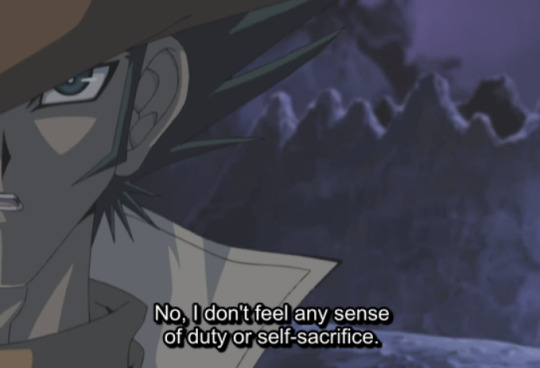
I just want to save my friend. That is all.
By the time Judai is facing Yubel in their final fight, Judai doesn’t have the moral highground against Yubel in any way whatsoever. They’ve both lashed out because of the pain they endured and killed countless people in the process of lashing out. The only real difference between them is that Judai is lucky. He had friends to support him at his lowest point, while Yubel didn’t. Does Judai learn from Jim’s example, and go out of their way to save Yubel the same way they were saved because Yubel is still a friend? Nope, Judai tries to kill Yubel at this point.
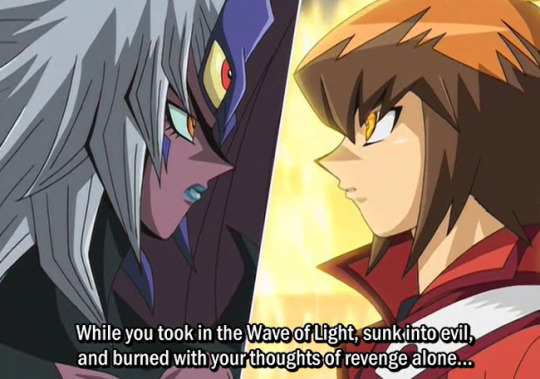
I made a lot of friends... And they all taught me something… real love is wide enough, large enough and deep enough to fill the universe. Your so-called love is only a conceited delusion.
Like, Judai, sweetie baby honey darling. How was Yubel supposed to make friends when they were floating in the empty void of space?
Judai hasn’t learned, they are still ignorant, and still turn a blind eye to Yubel’s suffering. After all if his love is wide enough, large enough,and deep enough to fill the universe then why don’t thy have any room in their heart whatsoever for empathizing with Yubel?
Judai making friends while Yubel was trapped in space doesn’t make Judai a better person than Yubel, it makes Judai lucky. Judai doesn’t even appreciate that luck, because he treats his friends like garbage. It’s not about whether Yubel is worthy of salvation, because Judai is a mass murderer and his friends still went to great lengths to save them anyway. It’s that Judai doesn’t want to empathize with Yubel, because they still want to remain ignorant and irresponsible. Judai wants to continue playing hero, with a very black and white definition of what a hero is. By this point Judai’s killed lots of people, but if he makes Yubel the villain in the situation, he can keep playing hero. He doesn’t have to look at himself and what he’s done, because blaming everything that happened on Yubel and then putting Yubel down like a mad dog allows Judai to absolve his own guilt. Judai practically ignores Yubel’s cries for help, even when Yubel spells it out for them.

I couldn't have lived with the heartache unless I felt that I was being loved...
At this point Yubel themselves acknowledges that their love was just a delusion. That it was a coping mechanism, because they couldn’t live with all the pain otherwise. WIthout it they would have just died, which makes Judai unmoved. The implication here is that Judai thinks yes, Yubel should have just died in that crater. It would have been easier for Yubel to die a perfect victim, then for Yubel to crawl out of that crater and go on to hurt other people. While that may be true the same can be said for Judai - it would have been better if Judai died rather than become the Supreme King. His friends could have put him down like a mad dog, you could have even called that justice - but they didn’t. Judai making no attempt to save Yubel isn’t because he thinks it’s morally wrong to save someone who’s killed as many people as Yubel has, or because he thinks he can’t forgive Yubel, it’s because Judai is taking the easy way out. Johan is a nice, easy victim to save, because he’s Judai’s perfect boyfriend, while Yubel is a complex victim that requires Judai to understand their suffering. Even the act of saving Johan isn’t about Johan himself, it’s about the fact that Judai feels guilt over Johan’s disappearance. What Judai wants isn’t really to save a friend, but to stop feeling guilty over that friend. Judai isn’t just disgusted by Yubel’s actions towards his friend, he also wants to avoid the guilt he feels over causing all of Yubel’s suffering, because it requires acknowledging the complex reality that he is both victim and perpretrator in this case, just as Yubel is both victim and perpetrator.
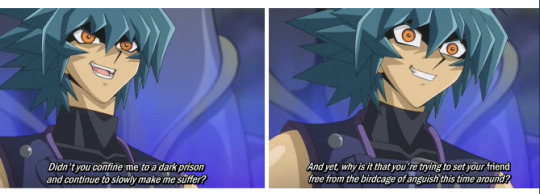
So how can an arc where Judai doesn’t try to save Yubel until the last possible minute, be better than an arc where Deku makes it his goal for the final act of the manga to save the crying boy in Shigaraki?
It’s because the story does not let Judai get away with his continual refusal to empathize with Yubel. Yubel’s entire character revolves around empathy, in the form of sharing pain. As a duel monster, Yubel’s effect is that they are a 0/0 attack monster who is immune to all damage, but when you attack them they deal all the damage back to you. Which means that Yubel will respond to all the pain they feel, by causing you just as much pain in return. Yubel is not a character who can be defeated in a fight, or a duel. In fact they’re the only Yu-Gi-Oh villain who never loses a duel once. The most Judai can do is duel them to a draw, and they draw three times. Yubel wins against everyone else who challenges them. In a way Yubel is like Shigaraki, the ultimate, unkillable enemy that can’t be done away with violence. Judai’s refusal to empathize with Yubel or attempt communication also makes them worse, every time Yubel is hurt they escalate. THe more Judai hurts them, the more they will hurt in return, it’s a cycle that will never be broken simply by killing Yubel, because Yubel is unkillable.
Not only that but the story has gone to great lengths to show that saving Yubel is the correct course of action. If Judai doesn’t save Yubel, he’s basically spitting on the selflessness Jim showed in saving him. In fact if he doesn’t save Yubel, Judai is contradicting his own words on what makes a good friend. Sho once asks Judai after witnessing his brother change, what he should do if a person you lov ehas changed into an entirely different person. What if they're a person you don't even recognize any more? A person you don’t even necessarily like anymore?
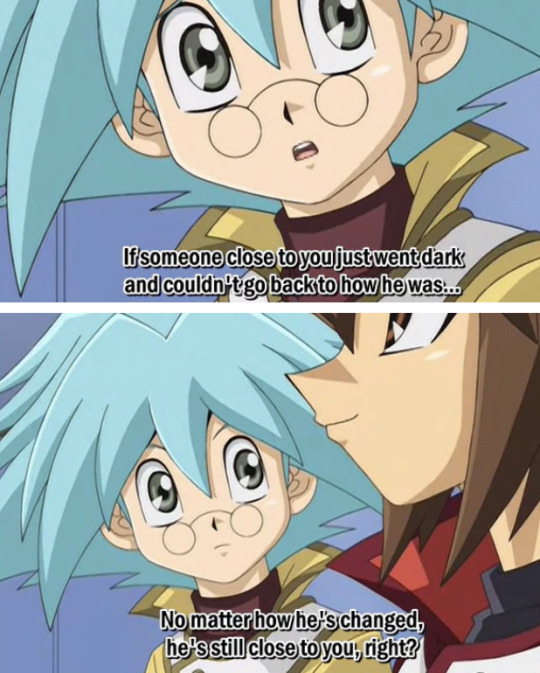
That's why if it were me. I'd probably just be looking after him until the very end, even if I didn't like him. I'd do it cause I think it'd prove that I care about him.
Judai doesn't even say that Sho is obligated to save his brother or morally redeem him, just that he has to keep looking at him instead of turning away or ignoring him.
Judai is being a bad friend, by his own definition. By choosing to deliberately look away from Yubel, Judai’s not living up to his advice for Sho for how you treat people you care about.
Which is why the resolution for Judai and Yubel’s arc is so important, because it’s done by Judai finally acknowledging Yubel’s pain, and promising to watch over them from now on, words that are followed by the action of physically fusing their souls together so they’ll never be alone again. Judai doesn’t just say pretty words about how they won’t ignore the crying child inside of Yubel, but instead he makes a sacrifice to save Yubel at risk to themselves to show their words are backed up by actions. Judai says Yubel will never be alone again, and then he commits.
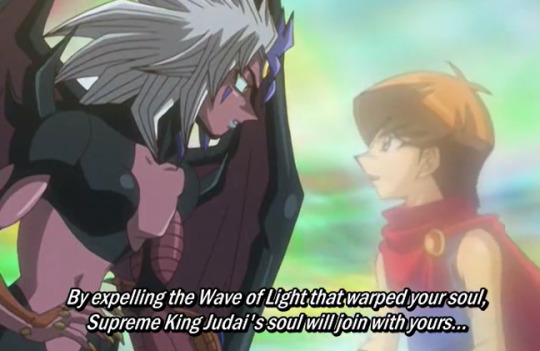
"And even if that means I won't exist anymore... I don't care."
Judai has resolved his character arc by this action, because Judai is finally taking on responsibility and that responsibility is watching over Yubel, so the two of them can atone together. Judai even says himself this isn’t an act of sacrifice on his part, but rather him finally accepting adult responsibilities.
Judai: I wouldn't sacrifice myself for you guys. I'm just going on a journey to grow from a kid into a man.
Judai needed to save Yubel to complete his character arc and grow as a person. If Judai hadn’t saved Yubel, he would have still remained an ignorant child. By learning not to turn a blind eye to Yubel’s pain, and also smacking sacrifices and physically doing something to atone for the way they ignored Yubel up until this point they’ve not only saved Yubel they’ve also done something to address their wrongs. This also continues into the fourth season where Judai’s personal growth results in him learning what kind of hero he wants to be as in Season 4 in order to atone for the spirits that Judai slaughtered, he decides to leave his friends behind and walk the earth with Yubel helping spirits and humans get along with each other. In fact Judai’s final speech as a character isn’t even about how strong he is as a hero, but how weak he is as a person.
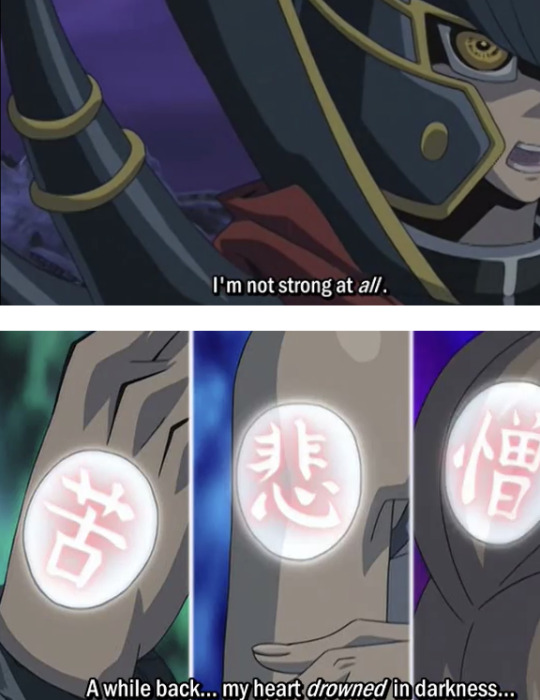
And I put my friends through some rough times. Form that, I figured a few things out... all I can do is believe in them.
The lesson Judai learned is because he’s weak, he needs to empathize and believe in other people the same way that his friends once believed in him when he was at his lowest point. Judai’s not the strongest hero, he’s the weakest one, but that gives him the ability to empathize with people who were lost just like he was, and guide them back from the darkness.
The story of how Deku became the worst hero.
I’m going to say this right now it might turn out next week that Shigaraki is just fine, and he’ll use the overhaul quirk to reconstruct his body. However, even if that happens Deku has completely failed at his goal of saving Shigaraki for the reasons I’ll illustrate below. In theory, Deku’s arc of saving Shigaraki, and therefore winning by saving should be much easier for the story to accomplish and also much less frustrating to watch. After all, Shigaraki has been around since the beginning of the manga, he’s literally the first villain that Deku faces. He’s also the first villain that Deku talks to, where he brings up the idea that there were some people All Might failed to save. There’s also many intentional parallels between the two characters, the entire manga is about their parallel journeys of becoming the next generation hero and the next generation villain. Shigaraki even directly quotes the line at one point that all he wanted was for someone in his house to tell him he could still be a hero, the same line Deku said in the first chapter was that he wanted his mom to tell him to be a hero instead of apoalogizing to him for being quirkless.
Not only is the setup for Shigaraki and Deku made obvious (Deku can redeem Shigaraki by telling him that he can still be a hero too), but Deku himself states out loud that he wants to save the crying child inside of Shigaraki.
Judai runs away from Yubel the whole time, whereas Deku is running towards Shigaraki and actively makes it his goal to understand Shigaraki and continue to see him as a human being rather than a villain. The story also makes it clear that saving Shigaraki is necessary to saving hero society as a whole. After all Yubel is just Judai’s victim. Whereas Shigaraki is the victim of all of society. He’s the crying child who was ignored. The cycle won’t be broken if heroes continue choosing to ignore people like Shigaraki, because more victims will grow up to replace him.
Shigaraki: Everything I've witnessed, this whole system you've built has always rejected me. Now I'm ready to reject it. That's why I destroy. That's why I took this power formyself? Simple enough, yeah? I don't care if you don't understand. That's what makes us heroes and villains.
Shigaraki rejects the world because the world continues to reject him. THe solution to this problem is not rejecting Shigaraki, because Shigaraki won’t go away, the system will just continue to reject people like Shigaraki. As long as heroes and villains don’t understand each other, they’ll keep being forced to fight and the conflict won’t end, because hero society is what engineers it’s own villains.
clear as day by the story itself. If the objective of saving Shigaraki is clear, then how exactly did the story fail in this objective? What went wrong? In this case it’s a failure of framing, and breaking the rules of “show don’t tell.” Stories are all about actions and consequences. When a character makes a certain action in a story, the way other characters around them, the world, and whatever consequences that action frames that action in a certain light. It provides context for how we are supposed to interpret that character in that moment.
For example, when a character does something wrong and another character directly confronts them over what they did wrong, that frames them as in the wrong. The story is criticizing the character for what they did wrong. Context is everything in a story. Stories are just ideas, so they require framing and context to communicate those ideas for the audience. Certain character attributes can be strengths or flaws depending on the context. My go to example is that if you put Othello in Hamlet, the conflict would be resolved in five seconds because Othello’s straightforward personality and determination would have him kill Hamlet’s uncle without questioning things. Whereas, Hamlet constantly questioning and second guessing himself would lead to the worst ending possible. However, if you put Hamlet in Othello, then Hamlet wouldn’t fall prey to Iago’s manipulations, because Othello doubts and questions everything so he wouldn’t believe Iago the way Othello did.
Hamlet’s contemplative and introverted nature can be a strength in one situation, and a flaw in another. Othello’s tendency to act without thinking things through can be a strength in one situation, and a flaw in another. Context matters, because context tells you how you’re supposed to interpret a certain characters actions, and therefore tells you more about that character. This is why people repeat “Show don’t tell” as the golden rule of storytelling, it’s one thing to say something about a character, it’s another to us the characters actions in the story itself to show them something about the character.
What’s even worse then breaking the rules of show don’t tell however, is telling the audience one thing, and then going onto show in the narrative something completely different. In that case the narrative becomes muddled and confusing to read. If I the narrator say “Hamlet is someone who overthinks everything” and then in the story Hamlet walks up to his uncle and kills him with no hesitation, then the narrator is straight up unreliable. It becomes impossible to tell as an author what message I’m trying to get across about these characters, because I’m telling you one thing and showing another.
This is why the writing fails in the second half of My Hero Academia because we are constantly told one thing, but then the story shows something entirely different and sometimes even contradictory to the thing we are being told.
Judai is a much worse hero than Deku, he always runs away from Yubel, and we’re never directly told that he’s supposed to save Yubel either. However, the narrative is incredibly consistent. Judai’s behavior of running away is consistent with his character. All the other character call Judai selfish for abandoning his friends (and they’re not even talking about Yubel). Judai is never painted in any positive light for his actions, therefore we as the audience understand Judai’s behavior is wrong and he needs to fix it. The narrative makes it clear that Judai needs to grow up, and Judai is never rewarded for his refusal to grow up, he’s ruthlessly chewed out, not by his enemies but also by his own friends. However, the narrative isn’t merciless on him either. Season 3 of GX is dark, but it’s not grimdark. Even when Judai loses his way, he’s still shown love and compassion by those same friends who go to great lengths for his sake. The narrative criticize Judai but it never insists that he’s beyond redemption and needs to be put down like a mad dog.
The message is very clear, that not only does Judai need to grow up, but he also deserves the chance to grow and change, which is why he should give Yubel a similar chance. In comparison the story sets out this clear narrative arc for Deku of understanding Shigaraki, but it never challenges him for failing to understand Shigaraki. If you listen to what the narrative says, how other characters describe Deku, and what Deku himself says and only read it on a surface level then yes, Deku’s goal is to save Shigaraki. If you analyze actions however, he is in effect just like Judai he never takes any meaningful action or steps towards Shigaraki, nor does he think of what saving Shigaraki might look like or entail.
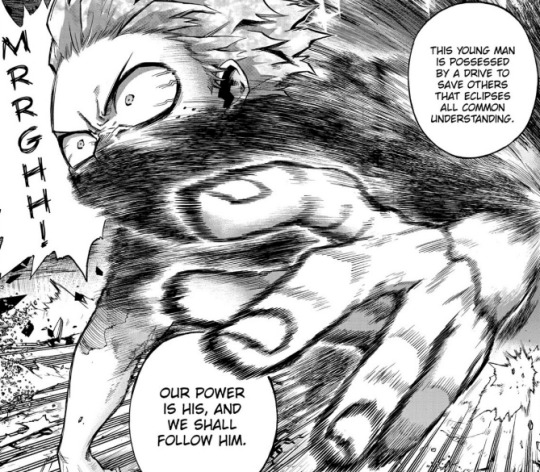
The story describes Deku as someone who is possessed by a drive to save others that eclipses all common understanding, but does the story give us any examples of that behavior?
Judai is characterized as a selfish, irresponsible child, and the story gives us countless examples of his immaturity and how it hurts others. Does the story of MHA do the same for Deku's purported virtues? Let’s run through Deku’s actions, step by step, the actions themselves and how they are framed in order to find any evidence that Deku possesses this drive to save others. Does Deku reflect at all on the question of:
Can Shigaraki be Saved?
Deku leaves on a journey to try to understand villains. When he makes a perfunctory attempt to understand and empathize with Muscle, and Muscle replies that some people are just evil does Deku keep trying to reach his heart? Nope, he just punches him.
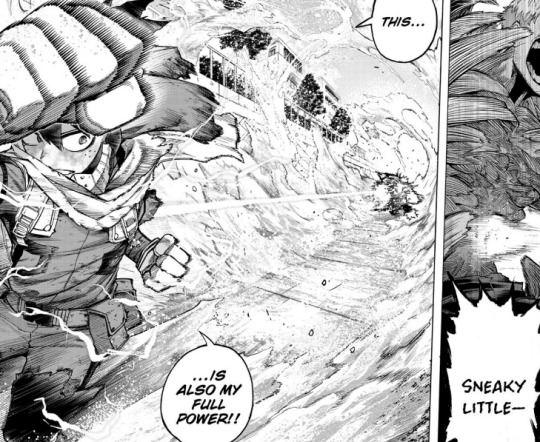
Well, if he’s failed in his goal of understanding a villain then does the story call him out on his failure? Does Deku face any sort of narrative consequence for that failure? Is he framed negatively for failing to understand Muscle, the same way that Judai is framed for abandoning Yubel? Nope. Deku doesn’t express any frustration at all over is inability to reason with Muscle. There’s also no negative consequence for Deku just choosing to punch muscle, it turns out that there was no reasoning with Muscle and some people are just bad eggs so Deku was right. It’s okay for characters to fail, but if a character fails and it’s not framed by the story as a failure then the writing itself as failed. Why even bother to include this scene in the first place if it doesn’t advance Deku’s character in any way? This scene in spite of showing Deku failing to understand someone actively paints Deku in a positive light, because of how much stronger he is ow that he can OHKO a guy that gave him trouble all the way back in the camp arc.
This scene doesn’t tell anything about Deku as a character, it just makes him look cool. In fact that’s precisely the problem, Deku isn’t adequately challenged as a character, because he’s never allowed to fail. Even when he does obviously fail at the things the narrative set out for him to do, he’s never challenged on those failures, because the priority isn’t to make Deku grow, it’s to make Deku look good. As I said before, Judai is the hero because he’s the weakest. Deku is the hero because he’s the strongest. Well, next a big flaw on Deku’s part is that he worshippd the same heroes that were making the world corrupt. Heroes like Endeavor who created people like Dabi. So, does Deku take action to either criticize the older generation of heroes, or separate himself from them in order to try to be better than them? Nope, he teams up with them. Not only that, Deku can’t do something as simple as tell Gran Torino out loud about his plans to save Shigaraki. If Deku feels that Shigaraki is worthy of salvation then he should at least try to make an argument here about his ideal of saving others.
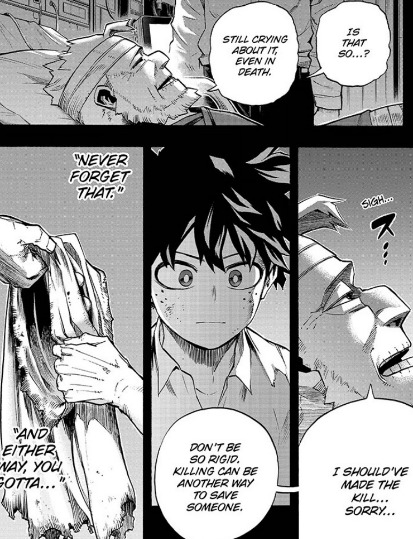
Now here’s the thing, if Deku hadn’t directly looked at the camera and told us he wanted to save Shgiaraki, would we be able to deduce his intentions from his actions? If you took away all of Deku’s internal monologue, and just showed him punching Muscular and saying nothing when Gran Torino says he may have no choice but to kill Shigaraki would anything about Deku’s actions indicate that he wants to save Shigaraki? Let me use avatar the last airbender as a positive example for a moment. People say that Aang’s desire to spare Ozai’s life comes out of left field, but like if you analyze Aang as a character down to their bending, and the way they react in situations they always prefer de-escalation, or taking a third option as opposed to confronting things head on. It’s literally why Toph says Aang has trouble learning earth bending, because as an airbender, he always tries to look for some other way to solve the problem, instead of a direct confrontation with force. As early as season one, Aang tells Zuko someone who has tried to kill him several times that he was friends with someone from the fire nation one hundred years ago and in a different situation they could be friends. Aang’s desire to save the Firelord may not have been told to us until the last possible minute, but Aang’s aversion to violence has always been a part of his character from the beginning. However, Deku never shows any similar aversion to violence. There’s basically no example where he ever tries to de-escalate a situation, or he avoids a conflict by seeking a third option.
Anyway, let’s move onto the next example. In the confrontation where Lady Nagant fights Deku, when Deku learns the fact that the heroes were employing government hitmen to attack people for uhh… exercising free speech does Deku give any reaction to this information? When Lady Nagant says that Deku is only going to bring back the status quo, does he show her any meaningful evidence that he won’t do that.
Deku’s response is because the world is so grey, he needs to extend a helping hand to others. Which you know what thay could be a response. Deku saying that his response to the corruption of the hero world is that he now understands that society led some people down the wrong path, so his way of addressing the wrongs of that society is lending a helping hand to as many people as possible even people he used to think was irredeemable.
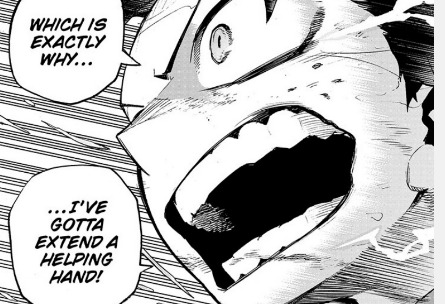
I will give Deku the benefit of the doubt, I think this is an acceptable answer. I can’t save everyone, but that’s not going to stop me from trying to save as many people as possible and maybe I can save people who were this society’s victims on the way too. However, does Deku demonstrate his resolve to extend a helping hand in any meaningful way.
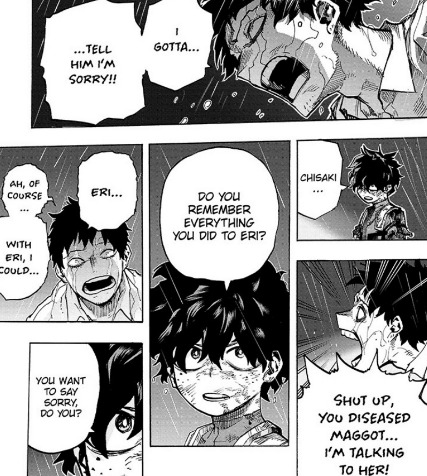
Deku is met with an armless, insane Overhaul who’s begging for someone to help heal his father figure in the Yakuza from his coma. This isn’t like Muscular who insists that there’s no helping him, Deku is met face by face with someone asking him for help. Deku’s gotta extend a helping arm whenever he can, because he knows some people were abandoned and led astray by this society… Unless that person is someone he doesn’t like personally. At which point he only helps them on a conditional basis. We are told Deku will save anyone and everyone, but Deku is met face to face with an armless man who is begging for help and Deku’s does nothing to help him. Deku’s not criticized for refusing to help overhaul either, it’s never brought up again. When Deku begins to experience a mental breakdown because of all the people he’s trying to help in the Dark Deku arc, we are told this is the result of Deku trying to save everyone, but we do not see Deku attempting to save a single villain after Muscular and Nagant.
He exhausts himself beating up villains that AFO sends after him, and only helping innocent civilians. Which would be fine if this arc were about how Deku is running away from his real responsibilities the same way that Judai was running, but that’s not what we’re being told. We are told that this is all part of an arc of Deku learning to understand villains and be a hero.
Deku is asked “Can you save Shigaraki?” by the story, but Deku never at any point has to deliberate on that question. Judai doesn’t deliberate on that question either, but him choosing not to think about things and stay ignorant is the point.
It’s actually fine to make Deku stagnate as a character. It’s fine to have him take the easy way out by just punching villains and giving up on them after one conversation. It’s fine for him to be empathetic to other people’s suffering, or even self-righteous. It’s fine for him to be ignorant.
He could be all of those things if it was a part of a narrative teaching him to unlearn his behavior. In fact the narrative might have been better if Deku started out by saying he didn’t want to save Shigaraki, that there was no choice but to kill him, because then at least his actions would be consistent with his words. Then his lack of empathy and his tendency to resort to violently beating up villains instead of avoiding violence would be character flaws he could work on. Deku however, is presented to us as this empathic hero who is always willing to give others a second chance though he never actually sticks his neck out in order to do so. Continuing on with our slow crawl through MHA, one of Deku’s friends is revealed as the traitor. Deku has a heartwarming scene fo saying that Aoyama can still be a hero, but look at his actions. He lets the adults in the room physically tie Aoyama in a straightjacket and imprison him, for the crime of… doing bad things while he was in a hostage situation. Apparently, if a bank teller helps the bank robber by giving them money when the robber has a gun to his head, the swat team should just snipe the bank teller. Not only does he not defend Aoyama against the adults, or stand up for him, or tell the adults they’re wrong to treat Aoyama a clear cut victim who had a gun to his head and was bing held hostage like he’s a villain - he also lets the adults use Aoyama an innocent victim as bait in order to lure out AFO. Deku tells Aoyama he can still be a hero, but he doesn’t defend Aoyama as a victim of being taken hostage, nor does he stop the adults from further taking advantage of him and throwing him right into danger. Some people are just led the wrong way that’s why they need to be extended a helping hand, but fuck Aoyama I guess. He needs to earn the right to be sympathized with by physically putting his life in danger.
Deku can’t even go out of his way to save a friend who he’s known for the better part of a year, when that friend is a complex victim forced to do bad things.
Then Deku and Uraraka have a conversation where they both, kind of ruminate on the idea that maybe the villains are human beings who are worthy of sympathy.
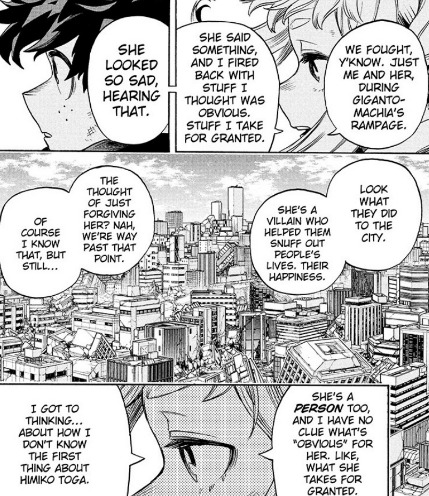
In fact Uraraka is actively trying to dehumanize Toga by looking at the destroyed city, so she won't have to think of Togaas a person.
The language here is also a major fault of this arc. It focuses far too hard on “forgiveness” over and over again. As I said before, saving Shigaraki isn’t about Shigaraki at all, it’s about Deku, and how he wants to use his power as a hero. Deku has even stated himself that he doesn’t believe that OFA is a power that should be used for killing people. So why does whether Toga or Shigaraki are forgivable or not even matter? It’s the same with Deku refusing Overhaul any sympathy. If he’s so morally opposed to abusers, then why does he work with Endeavor and defend him at every visible opportunity, even in front of his victims? Whether or not Deku can forgive Shigaraki doesn’t matter, because Deku is not the moral arbitrator or right and wrong. In fact Deku doesn’t even have any morals, so how is this a moral debate? Is there any point where Deku gives a clear definition of what he thinks right and wrong is? Does he quot Immanuel Kant to the audience?
Batman doesn’t kill people, not because he thinks that every last person on earth can be saved, but because Bruce Wayne an incredibly rich white man thinks that maybe he shouldn’t have the authority to decide who lives and who dies. When Bruce doesn’t kill the joker, it doesn’t mean he thinks the Jokers actions are forgivable, it’s because Bruce thinks it’s not his place to determine whether someone has the right to live.
The whole conflict that MHA presents us is that heroes pick and choose who to save, and only save the ones they deem as innocent. So, how does Deku saying repeatedly they can’t forgive Shigaraki contribute to that theme in any way? In fact by focusing on forgiveness, rather than whether or not he personally has the right to pick and choose who lives and who dies Deku is ignoring the elephant in the room. The question isn’t about whether Shigaraki’s redeemable or if his deeds should ever be forgiven. The question is whether Deku has the right to decide who gets saved and who doesn’t.
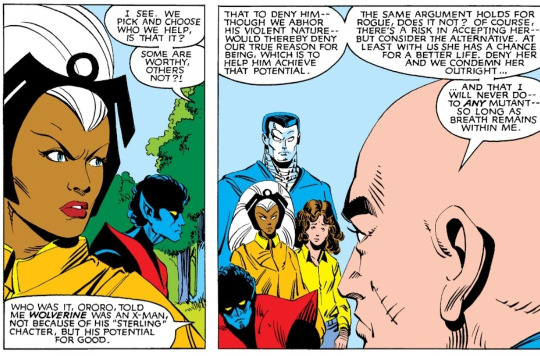
We are told that Deku as a character is someone who wants to save everyone no matter what, so Deku shouldn’t be focusing on whether or not Shigaraki is worthy of forgiveness, he should be making an idealistic argument like Xavier does in this panel. Why doesn’t Deku talk out loud with Uraraka on how he believes his power is for saving others, and not killing? If he’s meant to represent some idealistic hero, then why doesn’t he even talk about his ideals? Why don’t I as the reader know what those ideals are?
I think Xavier’s ideals of forcing the X-men to provide a good example to the mutant community, in order to try to earn the respect of other human beings is wrong, but at least he has ideals. He tries to inspire the other people around him to live up to those ideals. The story can criticize him for his ideals and point out how they’re wrong, while it can also uplift parts of his idelogy like where he believes there are no evil mutants. Deku has a chance to do the same to Uraraka, to tell her clearly, “I don’t think we as heroes have the right to pick and choose who we help…?” but he waffles. Not only does he waffle, but this moment is meant to be read as an indication that both Deku and Uraraka are sympathetic individuals who want to save their villains. They are supposed to look good and idealistic here and they don’t. For Deku it just seems like a repeat of his behavior with Overhaul. The only villains that are worthy of sympathy, are the ones that he personally decides are forgivable.
The story isn’t about whether or not it’s moral to save someone who’s killed as many as Shigaraki has. The story never seriously discusses any sort of complex morality or moral philosophy. Once again to bring up avatar, yes you can argue Aang sparing the life of a war crimminal is bad, but Aang mentions on multiple occasions that he wants to retain the cultural values of the airbending people. Aang has a morality, a consistent morality, it might not be a morality you personally agree with but at least he has one. Deku hates abusers, unless he’s next to Endeavor then he thinks abusers should be given the chance to atone. Deku doesn’t believe that One for All is a power for killing, but he never stands up to any of the adults who are blatantly trying to kill Shigaraki, he doesn’t even express out loud to Uraraka that he doesn’t think heroes have the right to decide who lives and who dies. In fact he’s given the perfect opportunity to, when Hawks kills a villain and it’s broadcast live on the news in font of everyone, but Deku never has anything to say about that. The reason Deku and Uraraka both put such an emphasis on “forgiving” their villains has nothing to do with the story itself. It’s because the author Horikoshi, is afraid that some people will misinterpret his story as saying that he actually thinks that saving a villain like Shigaraki means that he condones mass murder, so he has to have the characters talk about not forgiving Shigaraki.
Judai doesn’t have any consistent morals either, but once again that’s the point and something the story relentlessly calls him out on.
Cobra: Fortune would never smile on a fool like you who fights while prattling on about enjoying duels. Cobra: You are certainly a talented duelist. But you have one fatal flaw. Judai: A fatal flaw? Cobra: Yes, your duels are superficial. Someone who fights with nothing on his shoulders, cannot recover once he loses his enjoyment. What a duelist carries on his shoulders will become the power that supports him when he's up against the wall! Cobra: But you have nothing like that! Those who go through life without anything like that cannot possibly seize victory. Cobra: But I know that nothing I say will resonate with you... because you have nothing to lose but the match. Judai: I... Cobra: Afraid aren't you? Right now, you have nothing to support you.
Judai’s regularly called out for his superficiality. Judai is only a hero because he’s strong and wins fight, he doesn’t feel any responsibility towards other people, and in fact he loathes having to feel responsible for others. Judai isn’t just naive, he deliberately chooses to remain ignorant. Since he’s ignorant of his own faults, he makes awful decisions when it comes time for him to lead, and his friends die because of choices he made. We are told that Deku doesn’t want to remain ignorant, that he wants to understand villains, but Deku’s actual actions are him continuing to ignore society’s ills and the suffering of victims. In fact if you take away Deku’s internal monologue and the narration, Deku’s actions almost exactly mirror Judai’s.
Deku is just as superficial as Judai, and he also doesn't want to spend any time thinking about what kind of hero he wants to be, but the narrative never punishes him for it.
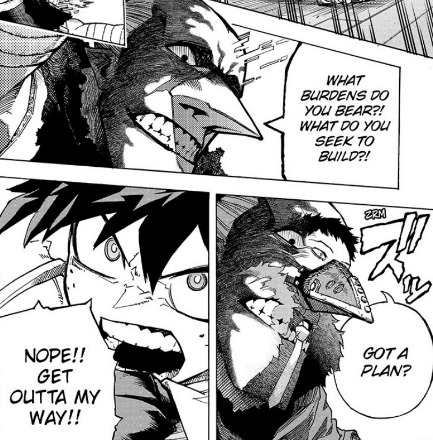
Judai is asked what burdens he has to bear and he has to meaningfull answer that question, Deku is allowed to get away with not having to think about anything. Deku remains superficial. Both Judai and Deku spend the entire arc running away from their villain rather than confronting them in any meaningful way. They both never express out loud any sympathy for their villain, or try to empathize. THey both never step down from the role of hero, and only confront their villain as a hero, because they don’t want to think about themselves as complicit or in the wrong. Shigaraki and Deku’s final confrontation mirrors Judai and Yubel’s but without the same clear framing. THe entire time Yubel is trying to get Judai to empathize with them, and Judai only responds with physical violence, because they don’t want to stop being the hero and because they can’t see Yubel as anything other than the villain. As soon as Deku arrives on the battlefield (by the way everyone else and their mom pointed this out, but Deku who doesn’t think OFA is a power for killing, is completely okay with a plan called the “Sky coffin plan” where every other hero was clearly trying to murder Shigaraki).
When Deku arrives he asks if Shigaraki is still in there, but he doesn’t do anything to try to reach Shigaraki, he jumps right to punching him. In fact he never tries anything besides punching him as hard as possible. How is punching Shigaraki with the force of a thousand suns saving him exactly? How is that different from how he tried to defeat Shigaraki the last war arc, before he saw the image of the crying child that made him want to try a different approach in saving Shigaraki? In Judai’s final fight with Yubel, it’s made explicitly clear that Judai is not trying to save Yubel, and that’s a fault on his part. In fact Judai gives the traditional “I have friends, and you don’t” speech to Yubel but it’s a subversion of how that speech is usually used. Usually that speech is used to show that the protagonist won because of they valued friendship,while the villain treated their friends poorly and only cared about power. However, it’s ironic in this case because Judai got all of his friends killed. Judai treats his friends like garbage. This speech isn’t used to show that Judai is winning because he values his friends more than Yubel does, it shows that Judai is a hypocrite, playing the hero in this situation where they are just as bad as Yubel. Judai’s not morally superior, he’s just lucky that he has good friends. Friends that were willing to save him. The only connection Yubel has to anyone else, Yubel’s only friend is Judai and Judai is a shit friend.
In fact, Mirio tries to give a version of the “You don’t have any friends” speech to Shigarkai, only for Shigaraki to get mad and tell Mirio that he does have friends and people he wants to protect.
This fact is also something that is blatantly ignored by Deku, even though Mirio tells him about it… even though we are told that Deku is trying his best to see the humanity in Shigaraki.
Judai blatantly admits they’re trying to kill Yubel. Which makes them a worse person, but a better character than Deku, because their actions are clearly framed by the narrative and consistent.
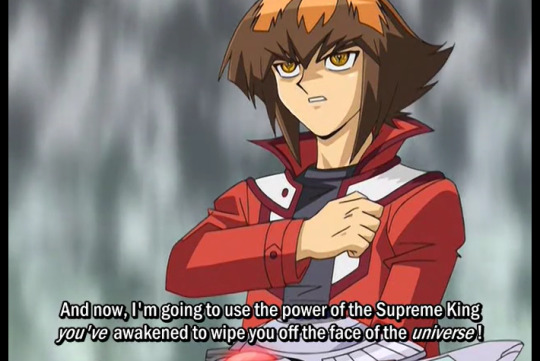
On the other hand we are told that Deku doesn’t want to kill Shigaraki, and yet everything Deku does makes it look like he’s just trying to kill Shigaraki and put him out of its misery. If we didn’t have Deku stating out loud that he wants to save Shigaraki and wants to see him as a human, there’d be nothing in his actions to indicate that he’s trying to avoid killing Shigaraki. Deku says he can’t pretend he didn’t see Shigaraki crying, but like, does he ever hesitate to punch Shigaraki, does he ever think that causing Shigaraki more harm is wrong when he’s already suffered so much? Deku says that Shigaraki is a person but does he treat him like a person? Does he try to talk to him like a person? To use avatar again, Aang does talk to Zuko pretty early on. Deku doesn’t even give the classic “We could have been friends under different circumstances” speech. When Shigaraki resists Deku’s attempts to see him as a person or emapthize with him, Deku’s response is to just resort to punching harder.
Which is in effect the same thing Judai does to Yubel, just kill them as a villain so they don’t hurt anybody else, but framed in an entirely different light. Judai is shown to be ruthless, and cold in his attempt to only settle the conflict with Yubel by violently putting them down. On the other hand we’re being told that Deku is compassionate and empathic while he punches Shigaraki with the force of a thousand suns.
There’s another eerie similarity between both of these final confrontations. At the climax of the confrontation, both Judai and Deku have a psychic vision where they see events from Yubel and Shigaraki’s childhood. This vision is supposed to help both characters understand the good in the villain they’re facing.
Let’s see the contents of this vision and how the visions change each character. Judai is shown a vision of his past life where Yubel sacrifices their entire body, and even their humanity to go through painful surgery to turn into an ugly dragon, all for the sake of protecting Judai in a previous life.
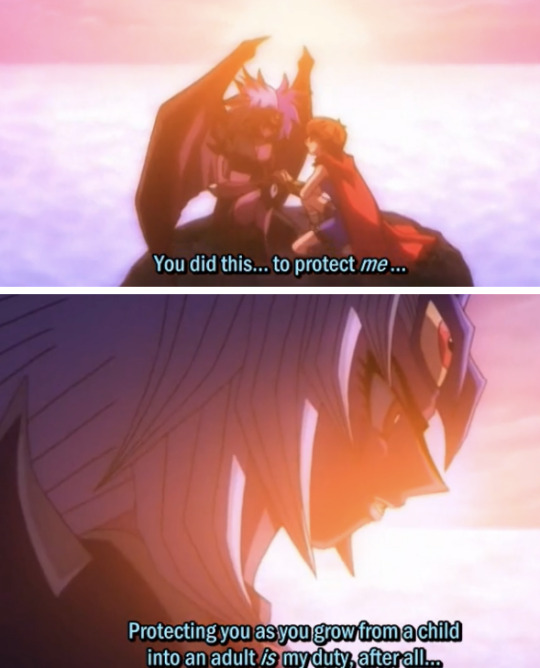
Judai is then forced to witness the good side of Yubel they’ve been ignoring all along to paint them as a villain. Yubel is simultaneously extremely selfish and willing to hurt people Judai cares about, but they’re also extremely selfless and will do anything to protect Judai and have made great sacrifices in the past for Judai’s sake. Deku gives lip service to not ignoring the humanity in Shigaraki, but Judai is literally forced to acknowledge the humanity in Yubel. Not only that, but Judai changes his behavior immediately after learning this new information. After seing the sacrifice that Yubel made for him in the past, Judai responds with a sacrifice of his own. A sacrifice that perfectly mirrors the sacrifice that Yubel once made for him. Yubel gave up their humanity for Judai, so Judai fuses his spirit to Yubel’s, becoming a human / spirit hybrid so Yubel no longer has to be alone.
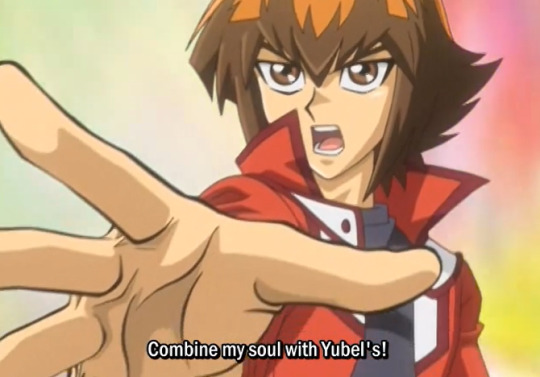
Judai also doesn’t just fuse their soul with Yubel’s in order to stop Yubel from destroying everything, it’s because both of them at this point need to atone together, and Judai is fulfilling his responsibility of watching over his friend until the end to prove that you care about them - as he said to Sho. Judai’s also fulfilling Johan’s dream of helping repair the bonds between spirits and humans, by reconciling with Yubel and repairing their bond. It’s also Judai atoning for his previous behavior of abandoning Yubel, by choosing to stay alongside them as they both atone together. Deku does sacrifice OFA during the fight against Shigaraki, but their sacrifice isn’t to help Shigaraki, but rather doing psychic damage to Shigaraki by using OFA is the only way to defeat them. He transfers OFA in order to break Shigaraki’s brain so he’ll stop reissting and Deku can beat him down. Judai fuses their soul together with Yubel out of empathy and a responsibility they feel to help their friend fater abandoning them, Deku transfers One for All to Shigaraki in order to hurt him and make him easier to punch. It's funny that Deku doesn't travel to Shigaraki's mind to learn more about him, but instead with the specific intent of harming him.
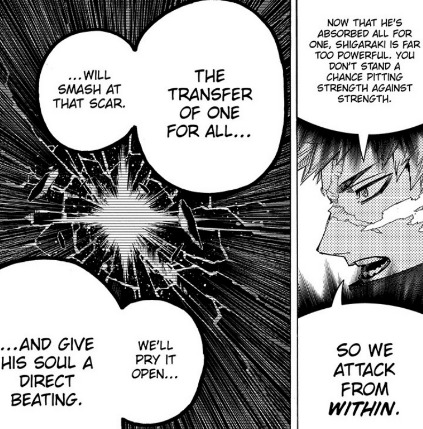
Once he's inside Shigaraki's mind, he doesn't take time to reflect on how Shigaraki used to stand up for bullied kids, or how he wants to be a hero to villains because no one else will stick up for the outcasts in society. No, he only care about Shigaraki when he takes the form of a child crying for help.
In the aftermath of the psychic vision Deku’s behavior doesn’t change towards Shigaraki in any way either. You could say he sacrificed his own arms in order to try to comfort Shigaraki within the depths of his own mind - but that’s not a real sacrifice either because his arms immediately come back. When Judai learns about the sacrifice that Yubel made in a previous life towards him, he stops seeing Yubel as an enemy and finds a way to resolve things peacefully between them. When Deku lanterns that Shigaraki’s a victim of All for One, and that his entire life was a lie, when he sees Shigaraki’s suffering first hand does his beavior twoards Shigaraki change in any way?
When he sees Afo has taken over Shigaraki’s body again, does he try to shout for Shigaraki, to tell Shigaraki to fight from the inside, to reassure Shigaraki that he’s still in there that there’s still good in him? Nope. He just punches Shigaraki some more.
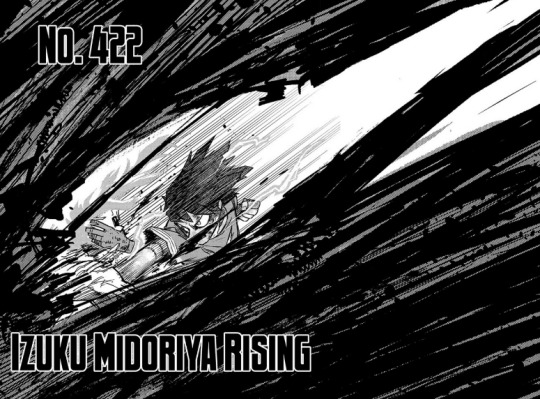
What Deku needed to tell Shigaraki is so obviously set up by the narrative too. Shigaraki wanted just one person in that house to tell him he could be a hero. Deku wanted his mother to tell him he could be a hero if he was quirkless. Deku sees that Shigaraki started out as a boy who wanted to be a hero, and who was manipulated into being a villain but does he try to appeal to the boy inside of Shigaraki by telling him he can still be a hero? Does he now see the good in Shigaraki? Nope, he just tries to kill him by punching him really hard.
I purposefully chose the images for the banner of this post, because it shows how differently MHA and GX treated its villains in the end. Yubel is embraced by Judai in the end, Shigaraki evaporates into dust.
"Judai, now that our souls have become one we will never be separated again. I have now been filled with your love and power. Let us fight together, against the wave of light leading this universe to destruction!"
Shigaraki could so easily have been given the love and empathy that Yubel was shown, but instead their life ends with no show of empathy from Deku, and with them dying believing that their long life of tragedy meant nothing in the end. Shigaraki realizes he's a crying kid, but he's never comforted.
Shigaraki: I only stole my body back from Master, and I didn't destroy anything. "In the end, I was just as you said... A crying kid, huh?"
Yubel is embraced and comforted, Shigaraki disintegrates into nothing.
One of these stories is apparently an optimistic story about heroes saving people, but it ends with the lifelong victim being killed in the most nihilistic manner possible, never receiving comfort, and never achieving anything with his long life.
The other story is a silly anime about card games, shows that when people are alone and suffering they can lash out and do terrible things. That all people are weak especially when they're alone, but the solution isn't to abandon them, or condemn them for their faults, but to believe in them and help uplift them the same way that Judai decides to uplift Yubel so they can atone together.
Which is why Deku gets an F in being a hero. Go directly to summer school. Do not pass Go. Do not collect $100.
#mha meta#ygo meta#mha 423#bnha 423#mha 423 spoilers#bnha 423 spoilers#izuku midoriya#deku#shigaraki tomura#tenko shimura#judai yuki#yubel#soulshipping#yu gi oh gx#yu gi oh
758 notes
·
View notes
Text
What Non-Pagans Need to Know About Fiction Featuring Pagan Gods
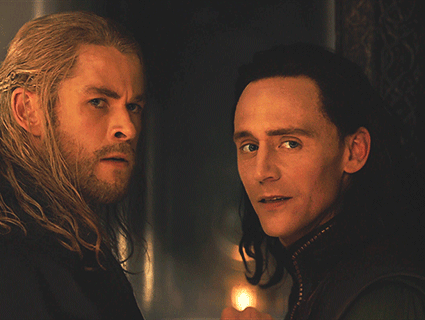
In light of Marvel's Loki show dropping a second season and a new Percy Jackson series on the horizon, I want to say some things about how fandom spaces can be respectful of real-life pagan religion.
Let's get one thing out of the way: literally no one is saying you can't enjoy fiction that uses pagan gods and heroes as characters. No one is saying, "Stop writing stories about our gods." In fact, many ancient cultures wrote fiction about their gods -- look at Greek theater or the Norse Eddas. The act of writing fiction about the gods is not offensive in itself.
But please remember that this is someone's religion.
The gods are not "just archetypes." Their myths are not "just stories." Their personalities are not a matter of artistic interpretation. For many pagans, the gods are very much real in a literal sense. I don't think Thor is a metaphor or a symbol -- for me, Thor is a real, autonomous spiritual being who exists outside of human perceptions of him, and who I have chosen to build a relationship with. Even if you are a hardcore atheist, I would hope you could at least be respectful of the fact that, to many modern pagans, the gods are both very real and very important.
When authors are not respectful of this fact, they reduce the gods, these very real objects of worship, to fictional characters. And here's the thing about fictional characters: they are fundamentally tools for authors to use to draw a desired emotional response from an audience.
Dracula's personality and behavior is wildly different depending on who is writing him, because different authors use Dracula to create different reactions in their audiences. In the 1931 film starring Bela Lugosi, he's equal parts alluring and disturbing, a symbol of America's mixed desire and disdain for foreigners. In Nosferatu, he's more strictly frightening and disgusting. In Francis Ford Coppola's movie, he's a tragic, romantic figure clinging to the last scraps of his humanity. In Netflix's Castlevania, he's an incredibly powerful being who has grown bitter and apathetic in his immortality. All of this is Dracula, and all of it is fine, because Dracula is not and never has been a central figure in anyone's religion.
Let's take a look at what happens when authors give this same treatment to real gods:
In Hellenic polytheism, Apollo is one of the most beloved gods, both historically and today. Apollo loves humanity, and humanity loves him back. He is the god of sunlight and of medicine, but also of poetry and song. He is one of humanity's most consistent defenders when one of the other gods gets wrathful. And while he does have dangerous or wrathful aspects of his own (he's also the god of disease, after all), he's also kind and soft with humanity in a way other gods often aren't, at least in some historic sources.
In the Lore Olympus comic series, Apollo is a villain. He's characterized as an abuser, a manipulator, and a violent man child. LO!Apollo is downright hateful, because the author wants us to hate him. Lore Olympus is a retelling of a myth about an abduction and forced marriage. Lore Olympus is also a romance. In order to get the audience to sympathize with Hades and root for his relationship with Persephone, Rachel Smythe needed to make someone else the villain. Apollo is the most obvious and extreme character assassination in Smythe's work, but several other gods (notably Demeter) also get the asshole makeover to tell the story Smythe wants to tell.
Here's where this becomes a problem: Hellenic polytheism is a fairly small religious community, while Lore Olympus is a massively popular webtoon with 1.3 billion views as of August 2023, print books available from major retailers, a TV adaptation in the works, and a very active online fandom. Rachel Smythe currently has a MUCH bigger platform than any Hellenic polytheism practitioner. Smythe and other authors are shaping how modern culture views the Hellenic gods, and that has a very real impact on their worshipers.
This means "Apollo is an abusive asshole" is becoming a popular take online, and is even creeping into pagan communities. I've personally seen people be harassed for worshiping Apollo because of it. I've seen new pagans and pagan-curious folks who totally misunderstand the roles Apollo, Hades, and Persephone play in the Hellenic pantheon because of Lore Olympus and other modern works of fiction.
There are tons of other examples of this in modern pop culture, but I'll just rattle off a few of the ones that annoy me most: Rick Riordan depicting Ares/Mars as a brutish asshole hyped up on toxic masculinity; Rick Riordan depicting Athena as a mother goddess; Marvel depicting Thor as a dumb jock; Marvel depicting Odin as a cold, uncaring father; DC depicting Ares as purely evil; whatever the fuck the Vikings TV show was trying to do with seidr; the list goes on.
All of these are examples of religious appropriation. Religious appropriation is when sacred symbols are taken out of their original religious context by outsiders, so that the original meaning is lost or changed. It requires a power imbalance -- the person taking the symbols is usually part of a dominant religious culture. In many cases, the person doing the appropriation has a much bigger platform than anyone who has the knowledge to correct them.
When Rick Rioridan or Rachel Smythe totally mischaracterizes a Greek god to tell a story, and then actual Hellenic pagans get harassed for worshiping that god, that's religious appropriation.
Religious appropriation is a real issue. This isn't just pagans being sensitive. To use an extreme example: Richard Wagner and other German Romantic authors in the 19th century used the Norse gods and other Germanic deities as symbols in their work, which was a major influence on Nazi philosophy. Without Wagner, the Nazis would not have latched onto the Norse gods as symbols of their white supremacist agenda. To this day, there are white supremacist groups who claim to worship our gods or who use our religious imagery in their hate movement. We are still reckoning with the misinterpretation of our gods popularized by Wagner and other German Romantics almost 200 years ago.
Again, no one is saying you can't enjoy fiction based on pagan mythology. But there are a few things you can do to help prevent religious appropriation in fandom spaces:
Above all else, be mindful that while this may just be a story to you, it is someone's religion.
Recognize that enjoying fiction based on our gods does not mean you know our gods. You know fictional characters with the same names as our gods, who may or may not be accurate to real-life worship.
Do not argue with or try to correct pagans when we talk about our experience of our gods.
Don't invalidate or belittle pagan worship. Again, this mostly comes down to recognizing that our religion is totally separate from your fandom. We aren't LARPing or playing pretend. Our sacred traditions are real and valid.
If you see other people in your fandom engaging in religious appropriation, point out what they are doing and why it isn't okay.
Please tag your fandom content appropriately on social media. Always tag the show, movie, book, etc. that a post is about in addition to other relevant tags. This allows pagans to block these fandom tags if we don't want to see them and prevents fandom content showing up in religious tags.
For example, if I'm posting about Athena from the Percy Jackson books, I would tag the post #athena #athenapjo #percyjackson #pjo. You get the idea.
And if fiction sparks your interest and you want to learn more about the actual worship of the gods, you can always ask! Most pagans love talking about our gods and trading book recs.
If you are writing fiction based on real mythology, talk to people who worship those gods. Ask them what a respectful portrayal would look like. If possible, include a note in your finished work reminding audiences that it is a work of fiction and not meant to accurately portray these gods.
#btw hades is also not a villain in helpol#this post is just mostly discussing how lo villiainizes apollo#shoutout to my roman pagan husband for proofreading and offering feedback#this post is Approved By The Council#psa#long post#paganism#pagan#paganblr#heathenry#norse heathen#norse paganism#inclusive heathenry#hellenic polytheism#helpol#religio romana#roman polytheism#roman pagan#marvel#mcu#loki series#loki season 2#percy jackson#percy jackson and the olympians#pjo#lore olympus#religious appropriation#my writing#white supremacy mention#white supremacy tw
418 notes
·
View notes
Note
I love picking at plot holes like scabs so i want my fight scenes to be as realistic as possible. However. There’s a creature in my head that says a buster sword is SICK AS HELL. What modifications would it need to be even remotely wieldable while still keeping its central appeal (huge sword big blade cool and sexy) intact?
You’ve made a mistake. You mistook suspension of disbelief for realism. This is a common problem that gets in the way of a lot of fantasy and sci-fi authors. So, don’t worry. It isn’t just you. However, realism vs believability is where your hangup is. Stories don’t need to be realistic to be believable.
The quick and dirty (and possibly unhelpful) answer is to create a world that justifies your buster sword, not a buster sword that’s trying to justify itself in a world that doesn’t want it. You step back from the sword itself and away from a world where reality dictates that it’s too heavy, too clumsy, too slow, and ask yourself: “in what type of world does this thing make sense?” And there’s about a billion different ways to create that.
The hangup with the realistic argument is that all of fiction is a lie. Good or bad, that’s what stories are. They can be very compelling, addicting, manipulative, feel incredibly good, and still be fake. The goal of a creator isn’t just to create stories that are believable, but for your audience to want to believe in them. Storytelling is always a joint venture between you and your reader. You are the salesperson asking your audience to come along for the ride. To keep their attention, you’ve got to spin up a good yarn. Build trust. The world has to feel right, but it doesn’t have to be right. Reasonable, not right. The goal is to take a cool idea and work backwards to how your society got here so that when seen from an outside perspective, the choice ultimately looks like a reasonable conclusion given the surrounding context. One of the better ways to build your reasonable conclusions is by studying the history of technological invention from the beginning to the midpoint rather than starting with the end point—the results.
History is full of weird, wacky, wild attempts and failures at creation. You’re not the first person to look at a human sized sword and wonder if it could, in fact, hit good. Or, really, better than swords that currently exist. Or, fulfill a battlefield role the sword was currently not occupying. Or, as we like to say, have real battlefield applications. The Claymore, the Zwhihander, the Zhanmadao are all real weapons that saw real, if not necessarily extensive, use. Like all weapons, they were specialized tools meant for particular battlefield uses. In this case, mainly as anti-cavalry support.
Ask yourself, why? Not just, why would I want it? Ask, why would I use it?
What actual purpose does the big cool blade serve beyond looking big and cool? What function does it fill on the battlefield? Why use the big cool blade instead of other weapons? What does it do better? What are some offsets which might account for the massive size? Technology? Superhuman enhancements, mystical or otherwise? Gravitic fields? Magic? Why is the big cool blade better suited to ensuring a character’s survival? What advantages does it provide? What is its practical value to warriors within your setting?
The initial defensive reaction is that we don’t need a reason because we have the Rule of Cool. That could be the reason, but I challenge you to go deeper. Go deeper than, “this was the weapon my character was trained to use.” The followup question is: why were they trained to use it?
In the real world, we can answer these questions both from a personal and from a larger social perspective. We may not be able to answer whether we’d use a gun, but we understand why humanity developed guns, why we use guns, and the purpose they serve both for personal protection and in their military applications. The answers don’t necessarily need to be good or smart. What matters is that an answer exists to feed your audience. When your reader starts struggling to believe, they begin to ask questions, they pick at the fabric of the narrative trying to figure out why their mind has rejected the story they were previously enjoying. What we, the writer, want to create is a chain of logic underpinning the narrative and its world. This way, when questions are asked, a reasonable answer is ready and waiting. While we won’t win over everyone, trust that your audience wants to believe. Trust that they’re smart enough to figure it out without being spoon fed. That way, you won’t fall into the trap of infodumping.
Worldbuilding always involves a lot more happening under the surface than ever makes it onto the page. Your characters will be the ones to demonstrate and act on the internal logic that’s been created for them without needing a billion questions to lead us from Point A to Point B.
If we look at human history in a wide view, we find that weapons are a fairly steady march forward that matches a civilization’s technological growth. We keep what works and discards what doesn’t. The crossbow replaced the bow as the main form of artillery in martial combat, but we still kept the bow. The bow still had practical applications. Guns eventually replaced the crossbow just like they replaced the sword, but it actually took a very long time. We had functional firearms in the Middle Ages.
Ease of Use
Ease of Training
Lethality
From a military standpoint, these are the three most important aspects for widespread adoption of any weapon. Easy to use. Easy to train. Lethal. The longer it takes to train a soldier on a weapon the more time your army is losing out on using that soldier and the more effective the weapon needs to be in order to justify its expense. Why give your soldier a big cool sword if they’ll never get close enough to reach the forward line to make the assault? Why have them use the big cool sword if operating the laser cannon is more efficient, effective, and keeps them alive longer? In the coldness of battlefield calculus, it’s often better to have cheap, efficient units rather than more expensive ones that might be more lethal but take longer to produce. No matter how good they are, you’re eventually going to lose them. Therefore, easy replaceability becomes a factor.
If you can answer those questions (and the myriad of other similar ones) you won’t just have a weapon, you’ll have a world. You’ll have more than a justification, you’ll have battlefield strategy, tactics, and a greater understanding of how the average layman characters in your setting beyond your main character approach warfare and possibly a technological history. You might even have several functional armies.
Ultimately, this is a game of value versus cost. Most settings that use big cool swords sacrifice ease of use and ease of training to amp up lethality. The weapon having a specialized function or only being usable by a specialized unit helps if that unit’s battlefield effectiveness is justified. Or, you could just have a weird technological outlier where its effectiveness doesn’t quite justify its cost even if the individual warrior is effective. A good example of this is in shounen anime where one character has a specialty that no one else has, a really cool, effective weapon that never appears anywhere else, because the length of training, high skill floor, and finicky nature of its use make it difficult to justify widespread adoption.
The danger is assuming there’s a right answer. There isn’t one. The value in learning the rules of real world violence is so you can break them. This way you can tell the difference between the vital rules necessary for suspending disbelief and don’t accidentally break the ones you needed to keep your audience invested.
-Michi
This blog is supported through Patreon. Patrons get access to new posts three days early, and direct access to us through Discord. If you’re already a Patron, thank you. If you’d like to support us, please consider becoming a Patron.
550 notes
·
View notes
Text
Okay, my brain refuses to think about anything other than Murderbot, so I looked at every use of the word "friend[s]" in TMBD and... created some pie charts. Normal human activities.
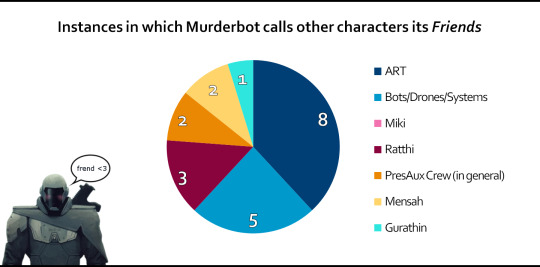


Some Thoughts™ I had while putting this together (under the cut):
In All Systems Red, Murderbot notes that the PresAux crew are all close friends (twice! and goes on to explain their internal relationships which I think is very cute). This is pretty much the only use of 'friends' in ASR, except for when Murderbot says that SecUnits can't be friends with each other.
It seems that this may be one of the first times Murderbot has ever really been around a group of friends before? Murderbot notes that this is not the norm for its contracts and admits that the fact that they are all friends and the way they interact with each other make it actually enjoy that contract (before!!!! the hostile attack, so it already enjoys this contract before they start seeing it as a person etc ghghhhh). [Inference: Friendship seems enjoyable.]
The first character that calls Murderbot its friend is ART in Artificial Condition. Murderbot immediately refutes this (and then goes on to call ART its friend to its clients for the rest of the book). [Inference: Maybe ART is Murderbot's friend. And maybe that is... agreeable]
Rogue Protocol has more than twice as many instances of the word 'friend' as any of the other novellas. Why? Miki. Friendship and its implications for non-humans are a central theme because Miki is friends with everyone. Murderbot initially scoffs at the notion that Miki and Miki's humans are friends. At the end of the book, after witnessing how desperately Don Abene tried to stop Miki from trying to save them, and her grief after its death, Murderbot has to admit that she had in fact been Miki's friend. [Inference: Humans can be friends with bots and can sincerely care about them]
In Exit Strategy, Murderbot tentatively uses the word "friends" for its humans for the first time (several times actually). It questions whether it can actually call them its friends or not and later realizes that it had been afraid what admitting that the humans are its friends would do to it. At the end of the book, Mensah tells Murderbot the PresAux crew are its friends, which is the first time a human has directly said that to it (at least on-page). [Inference: Humans can and want to be Murderbot's friends]
In Network Effect, Murderbot seems to be more habituated to the word 'friend', confidently calling ART and Ratthi its friends, like it is no longer just trying the concept on unsure if it fits. There are many instances in which other characters refer to MB as ART's friend or the other way around and Murderbot's humans refer to Murderbot as their friend several times. Generally, there seems to be less hesitancy, because yes, all of them are Murderbot's friends, why wouldn't they be. [Inference: SecUnits can have friends. This SecUnit has friends. They care about it a lot.]
Conclusion: The Murderbot Diaries tell the story of a construct that does not seem to consider the possibility of friendship for itself and is fine with that - until it accidentally starts caring a little too much and suddenly more and more people annex it as a friend (ew) to the point where it can no longer deny that this is happening and has to begrudgingly admit that yes, it has friends now and maybe that is actually not a bad thing.
#the murderbot diaries#murderbot#𓄿#hi i'm READY to write a thesis about murderbot i am having way too much fun with this#i created a pretty excel spreadsheet and everything#i don't know why i did this but now i can look at them while i think about this more! so i figured i'd share them haha#i didn't count uses of 'friendly' but special shoutout to when MB is all alone in its cold cubicle missing 20% of its body mass#and starts putting on a show because 'the friendly noise would keep it company' 😭😭#i feel sick thinking about murderbot all alone on its own not knowing what its like to have friends watching media for 'the friendly noise'#also YES okay i wanted to make a point about miki there but i just#couldn't bring myself to talk about that more so... yeah#also uhhh this data is very subjective#i didn't count particularly ironic uses of 'friend' and generally did not count every instance of friend and sometimes it was a hard call#also i probably shouldn't have counted the times murderbot refered to drones or secsystems as its friends (often after hacking them)#but murderbot does seem to care about them and shows kindness and respect and sometimes points out that a system is friendly#so while i don't think MB means “friend” in the same way referring to them as when it refers to ART for instance#i still think its CUTE and also kinda funny how many times that happened so i decided to keep those!!!#but yeah take my data with a grain of salt lol
799 notes
·
View notes